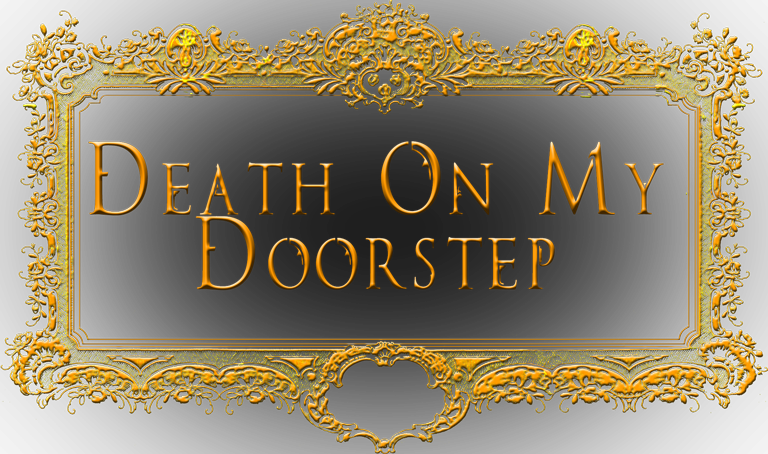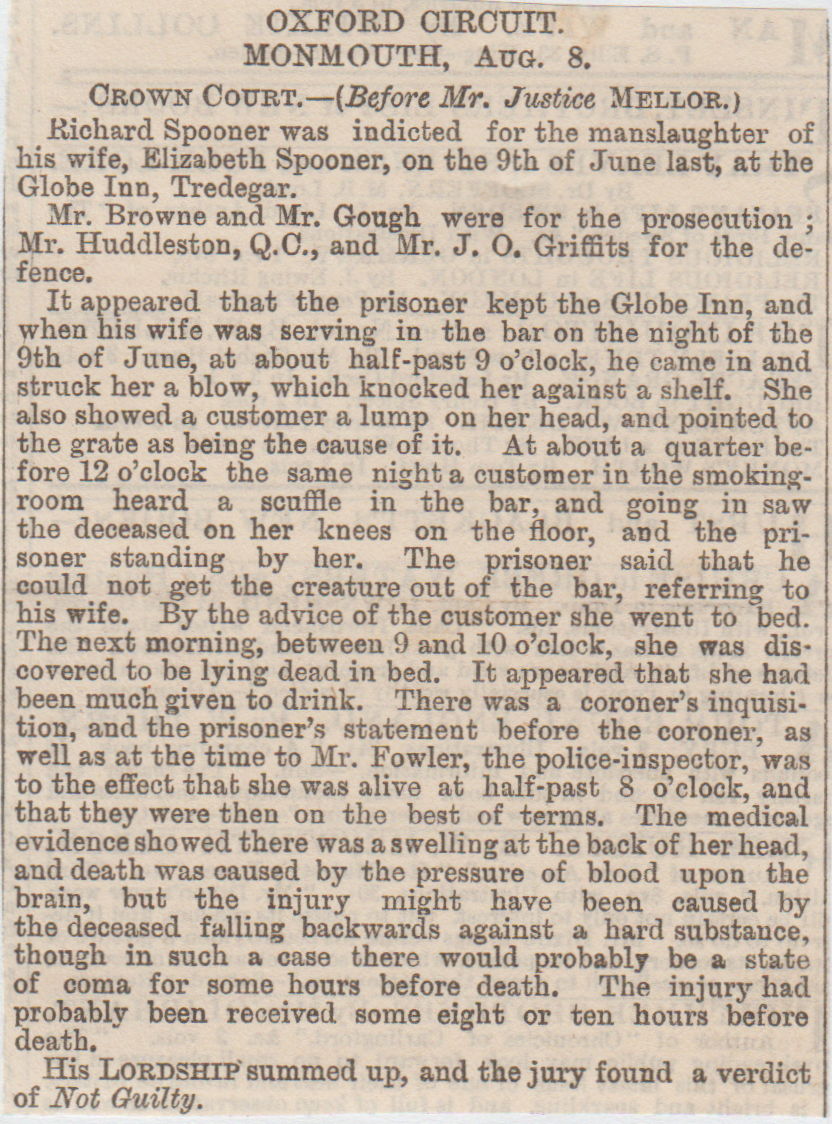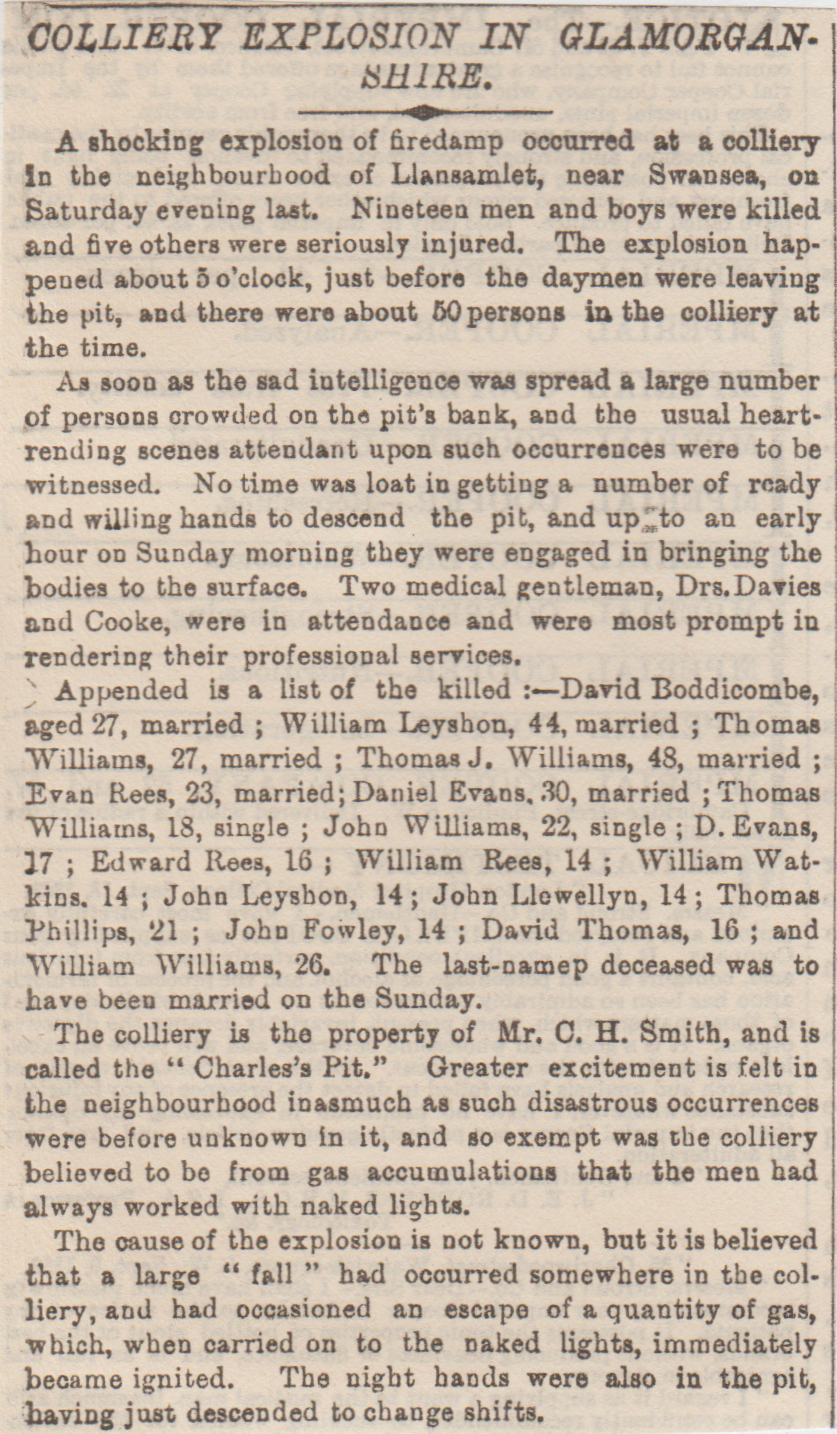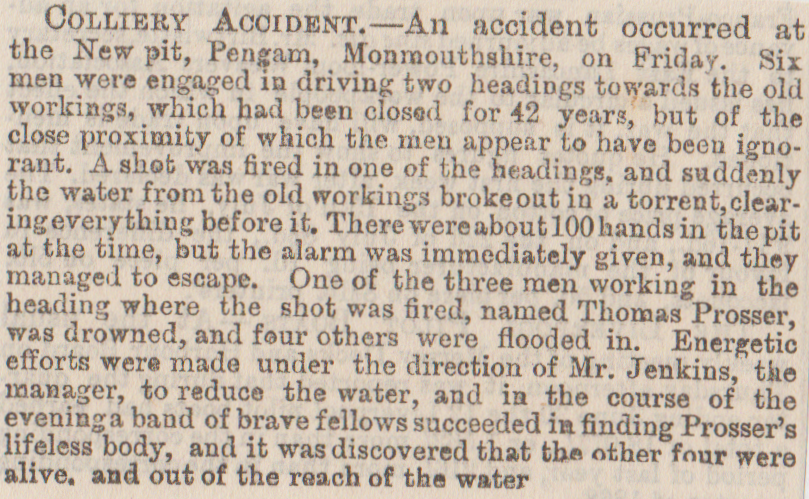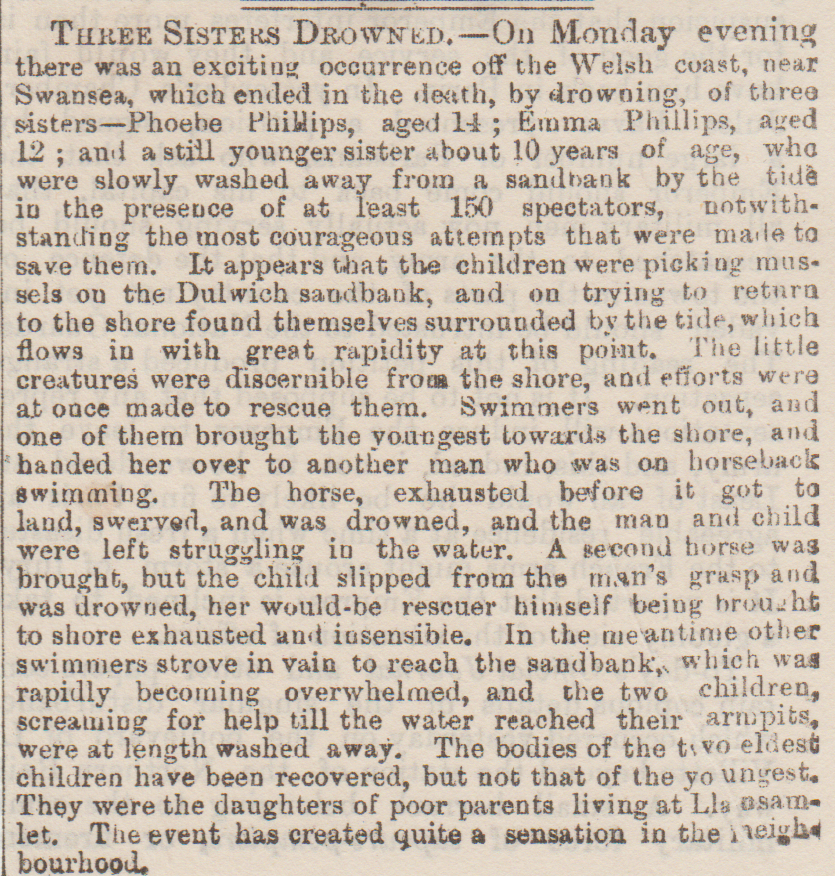1/ Globe Inn, Tredegar, (Manslaughter? Globe Inn now demolished, was down Church St, Tredegar, near the corner of Stockton Way)
2/ Bala Lake Drownings, July 1904
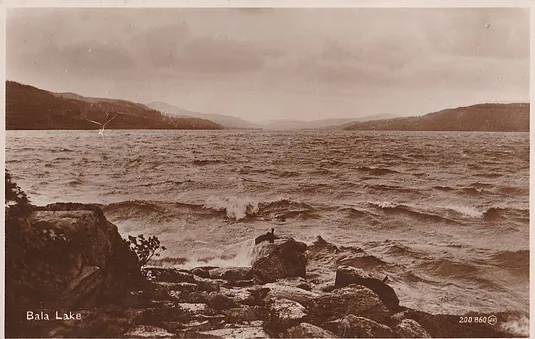
Edwin Baker from London and George Eliott from Nottingham, both photographers, hired a boat from Claudius Twinney to go fishing on Bala Lake. The group had apparently been for a few beer’s beforehand and this could account for the following disaster. Richard Jones was passing by and heard cries for help coming from an upturned boat on the lake. He went to rescue them in his boat but only Eliott could be found. Baker and Twinney clung to the boat for about twenty minutes, but couldn’t hold on. The lake was dragged but no bodies were found, but a week or so later, 70-year-old Twinney’s corpse was floating on the surface.
3/ Usk Murder, June 1869 (Murder in 1867)
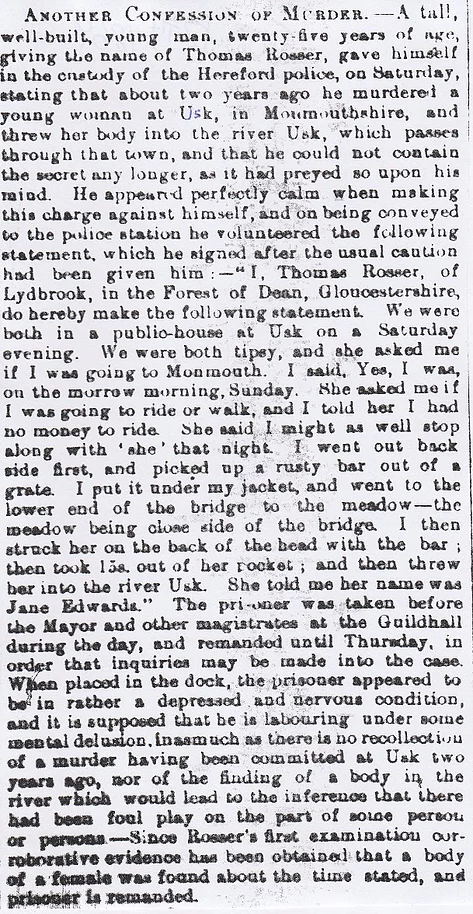
4/ Dunraven Castle Skeletons, December 1910
A bank was washed away at Seamouth near the entrance to the grounds at Dunraven Castle and revealed three skeletons. Locals around the area believe they are the bodies of sailors washed up on the shore. (Where are they?)
5// Dunraven Castle (Fatal Fall) August 1885
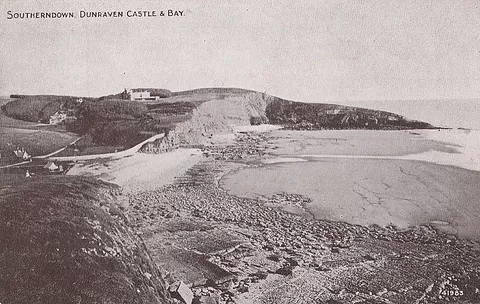
A young man by the name of Matthews was walking along the rugged coastline of Wales when he decided to climb the cliff (shown above). The problem was he slipped and dropped to the rocks below, causing his death. Matthews was a 22-year-old Bristolian and there on holiday.
6/ Dunraven Castle, (Teenagers Death) October 1836
A freak accident took place in the gardens at Dunraven Castle, as the gardener, with help from the game-keeper and his son, were picking the apples. The young lad fourteen-years-old was climbing the branches of the apple tree when he got his head lodged between two branches, then to cap it all, the branch he stood on snapped off. It acted like a small gallows and his neck was dislocated. The father of the lad and the gardener didn’t see anything for a few minutes and by the time they got him down, he was dead.
7/ Chirk Castle near Wrexham, (Pool Death) August 1915
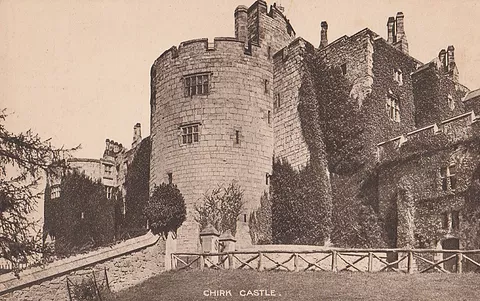
This castle (above), was the seat of Lord Howard de Walden, and it was he who was having a few guests stay over at the Castle. The niece of Lord Knollys, who was King Edward’s private secretary, was one of those guests and she was having a swim in the pool when she suddenly vanished. Lord Howard’s sister was there, along with another lady and she saw her disappear. Guests and staff went to the spot where she went down but could not find her. In the end, Lord Howard had the pool drained and her body was found. She was only twenty-eight-years-old. (Is the pool still there?)
8/ Cardiff Castle Suicide, October 1869 (Butler’s Self Destruction)
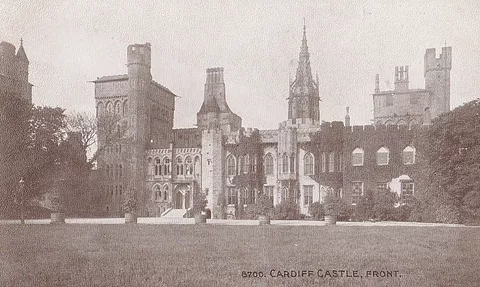
William Nash was a 32-year-old butler to the Marquis of Bute at Cardiff Castle. He’d only been in the job for four months or so, but he was a conscious and diligent worker. He started ranting and raving during the week that all the “ornamental plate” was stolen and he thought the police were pursuing him. His workmates managed to allay his fears that everything was OK, but he wouldn’t have it. They sent for a doctor and he was kept in his room, along with a young man named John David to keep an eye on him. Meanwhile, the plate had been checked to see if any was missing, but it was all there. John David went to check on him and saw him on his knees, then he realised that Nash had hung himself with some cord. Nash had put the cord through a ring attached to the ceiling. He was cut down, but he was dead as a dodo. The verdict was that “Deceased destroyed himself while in a state of temporary insanity”.
9/ Llangibby Quadruple Murder, (Llangybi?) July 1878
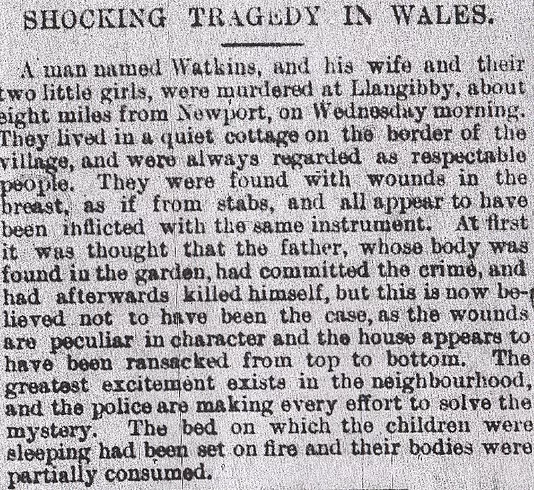
10/ Bardsey Island Lighthouse (Lighthouse-Keeper Death) July 1897
Head lighthouse-keeper of Bardsey Island, Mr Jenkins, met with a nasty accident which resulted in his death. It is believed he was out shooting rabbits with his assistant lighthouse-keeper when he fell over a hundred and twenty-foot cliff. His skull was fractured and it was a full four days before they could get any medical help to him, but he died in the end, anyway.
11/ Efenechtyd Rectory near Ruthin, September 1888 (Churchyard Suicide)
A report of a suicide at Efenechtyd Rectory near Ruthin was called in to police. They discovered that Mr E.Owen, the third son of the Reverend Elias Owen, the rector of Efenechtyd and St Asaph, was found hanging by a rope from a tree in the churchyard.He had been troubled by his course at college and thought that he’d failed. His sister found the body. Apparently, he was an excellent goalkeeper and was one of the best in Wales, but he sadly left a wife and two kids were now fatherless.
12/ Taff Vale Railway Fatality, February 1899
Rees Thomas an engine-driver aged thirty-one, who was residing at Stuart Street in Aberdare, was killed on the Taff Vale Railway yesterday morning. He leaves a widow and two young children.
13/ Tondu Yard (Porthcawl) March 1899
Trains were delayed at Tondu Yard from some unknown cause. A messenger was consequently sent to the signal-box, where he discovered the signalman, fifty-year-old David Roderick, dead at his post.
14/ Aber Waterfall Fatality, near Bangor, April 1885
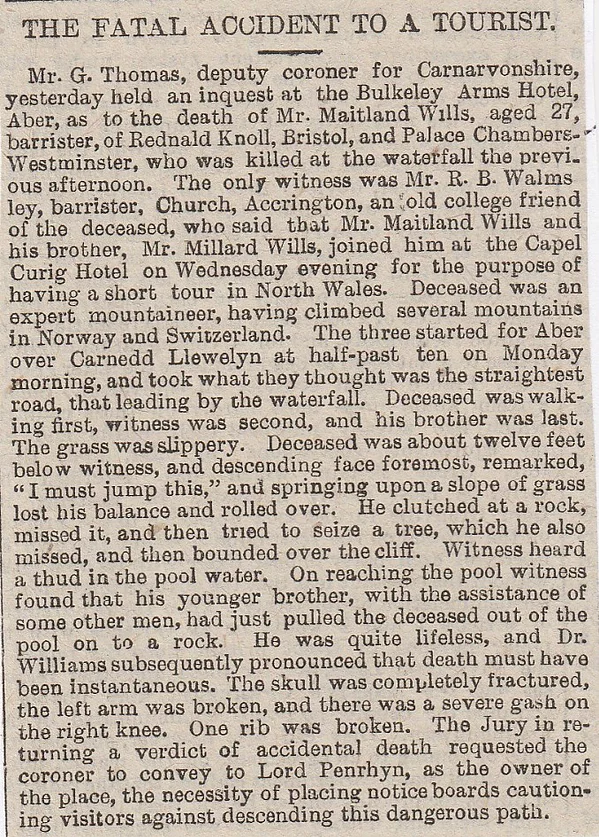
15/ Rhyl Station Fatality, June 1885
On Saturday evening an inquest was held at Rhyl on the body of Elizabeth Davies of Abergele. The woman and her husband were returning from an excursion. The husband left the train at Rhyl and it moved off without him. The wife, who saw his failure to catch it, opened the door, leapt out and was killed. The jury returned a verdict of “Accidental Death”.
16/ Penllyn Castle area (Child Death) July 1898
Charlie Grove aged six, the son of the butler at Penllyn Castle, was riding on a horse and waggon, when he fell off, with his head being smashed to atoms between the wheel and the axle. He also had several ribs crushed and a broken collar-bone. He died at the scene of the accident.
17/ Grangetown Drowning, Cardiff, December 1885
A fatal ice accident occurred at Grangetown in Cardiff, when a number of people were skating on the roach pond when the ice gave way and a man named Grant, who lived at Penarth, was drowned. He leaves a widow and a large family behind.
18/ Powis Castle Fatal Accident, near Welshpool, May 1899
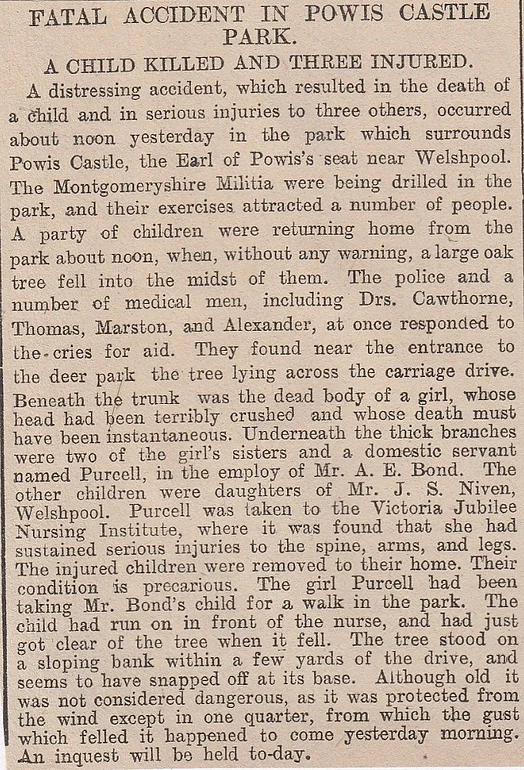
19/ Lower Deep pit, Blaina, (Father Killed) December 1885
At the Lower Deep pit at Blaina on Thursday, a man named James Fox and his two sons, Robert and William, were at work together when a fall of roof took place and almost buried them. The father was killed on the spot and his sons were very seriously injured. The deceased man had only recommenced work that morning after a severe illness.
20/ Hay-on-Wye Suicide, June 1907
This was an inquest into the suicide of 42-year-old Elizabeth Prosser, the wife of John Prosser, the farmer at Brilley Court Farm near Hay. Her mother, Mrs Weale, explained about how she went into the granary over the cider-house and saw her daughter suspended by a rope, which was attached to a wire stretched between two beams. Apparently, she had been suffering from depression and also had a heart condition, so these two things contributed to her thinking that suicide was the best way out.
21/ Cwmbria Murder, October 1896
At Swansea, an inquiry held into the circumstances attending the death of Jesse Hill, who was missing from his home since September the 26th and whose body was discovered in a pond near a cabbage field at Cwmbria, showing signs of brutal treatment before death, was concluded on Thursday. A verdict was returned that deceased was wilfully murdered by some person or persons unknown.
22/ Vine Inn Pub Explosion, Ystalyfera? December 1872
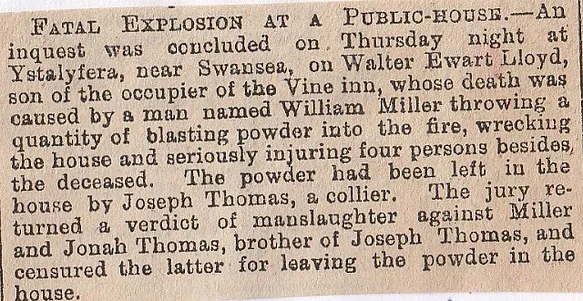
23/ Tintern, (Body Found) November 1896
The body of an unknown man was found in bushes near to the roadside in a dreadfully decomposed state. The verdict of the inquest at the Ship Inn, Tintern, was “Found Dead”.
24/ Llandovery Station Fatality, December 1885
A shocking accident occurred on Monday evening at Llandovery railway station. Two cattle dealers named Thomas Jones and David Davies of Penlan, had been loading cattle waggons at the station and were crossing the line for the purpose of booking when they were knocked down by a train which was shunting. Jones was killed on the spot and Davies sustained very severe injuries.
25/ Chepstow Rugby Death, October 1896
In a football match under Rugby rules at Chepstow on Saturday, a player named Johnston aged nineteen was so badly hurt that he died on Monday afternoon. Another player, Williams, had to be carried from the field, but he is progressing favourably.
26/ Carnarvon Murder, May 1885
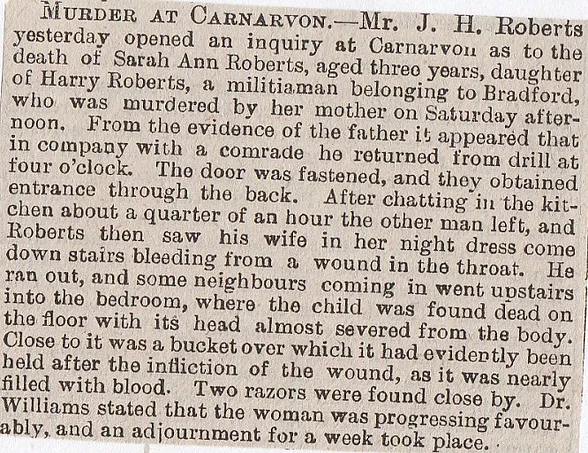
27/ River Monnow Drowning (Monmouth) April 1885
The Reverend J.Gregory, Primitive Methodist minister at Monmouth, fell into the Monnow while fishing yesterday and was drowned. He leaves a wife and two children. The body has not yet been recovered.
28/ Ferndale/Mardy (Tourist Cliff Fall) April 1885
The body of a man, supposed to be that of a tourist, has been discovered at the foot of a huge rock between Ferndale and Mardy in Glamorganshire, in a mutilated condition. The man appears to have fallen over the rock- a distance of about a hundred feet. The body has not yet been identified.
29/ Carnedd Dafydd Suicide, August 1882
A body of a smartly attired tourist was discovered on the side of Carnedd Dafydd, a mountain midway between Bangor and Capel Curig. Judging by the decomposition he had been up there a few days and had shot himself in the temple with a revolver, still clutched in his hand and a bottle of whisky laced with poison also there. He had £5 in gold on him but left nothing that would help in identifying the gentleman, other than a watch made in Liverpool.
30/ Llanberis, (Shocking Death) October 1885
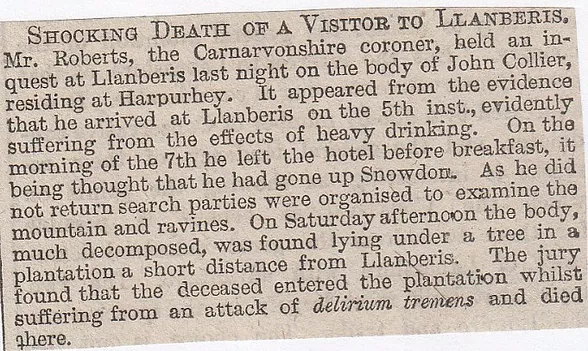
31/ Rhos Drowning, near Wrexham, July 1885
On Saturday morning three young men went to bathe in a pool at Rhos near Wrexham. One of them, Josiah Jones aged twenty-six, employed at the Bersham Colliery, while swimming across the pool, was seized with cramp and sank.
32/ Sciont River Body Found, (Carnarvon) July 1885
A youth named Owen aged sixteen, youngest son of Mr John Owen, a coal merchant in Carnarvon, was drowned on Saturday evening whilst bathing in a pool in the Sciont river. He was able to swim and it is supposed he was seized with cramp. The body was recovered soon afterwards.
33/ Hirwain, (Man Crushed in Fall) August 1833
A miner at Hirwain, Thomas Davis from Rumney, was pushing an empty tram into the carriage of a balance pit, when he missed the track and fell with the tram over 120 feet, to the pit bottom. He was discovered in a mangled condition, with a section of his skull about the size of a man’s palm that was found in the area. He leaves a widow an three children.
34/ Mountain near Cowbridge? (Murder Confession) November 1885
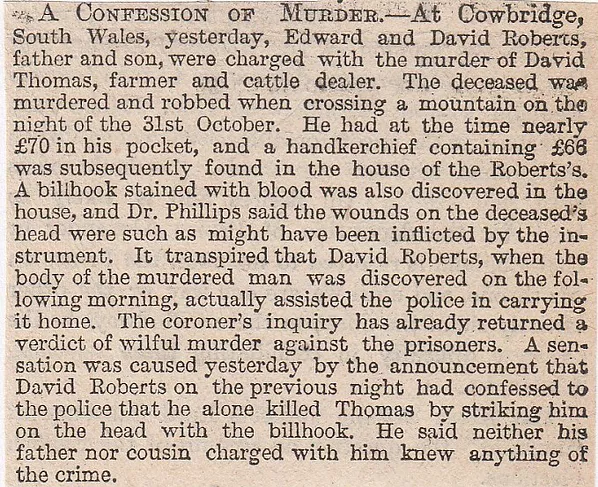
35/ Dinbryryn Hall Suicide, Llangollen, November 1884 (Now Dinbren Hall)
A suicide was committed at Dinbryryn Hall, Llangollen, the seat of Timothy Kenricks. The wife of Jonathan Hughes, the gamekeeper, loaded a gun in the hallway and blew her brains out. Her husband heard the gunshot and went rushing to the spot and found his wife lying dead on the floor. There was nobody else at the Hall but those two, as the family were away. The only feasible excuse for her suicide was that she had been getting severe migraines and various other pains in her head.
36/ Pontypridd, (Frozen to Death) December 1885
A cattle drover named William Butler about fifty-years of age was found yesterday frozen to death near Pontypridd. It is supposed that he fell from his horse, became insensible and perished in the intense cold.
37/ Wrexham, (Attempted Murder/Suicide) August 1896
On Monday at Wrexham, Hugh Annesley Edwards was charged with attempting to murder his wife and with attempting to kill himself on July 3rd. The prisoner was eating gooseberries in the garden and his wife complained of his doing so. He struck her and cut her throat with a razor, afterwards cutting his own throat with a knife. He was committed for trial.
38/ Welshpool/Montgomery, (Two Women Killed on Railway) September 1885
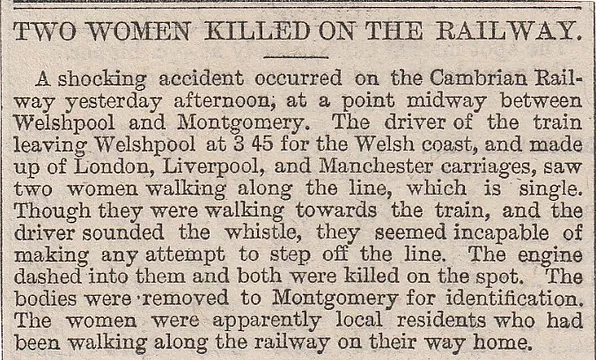
39/ Brecon (Ship Street Death) May 1836
The Pig Fair at Brecon had a slightly melancholy tinge to it, when news of a fatal accident was being talked about. The son of John Price from Brecon, aged around fourteen-years of age thought he would try and stop the “Swing-Swang” in Ship Street, but the apparatus struck him in the throat and he died almost immediately from his injury.
40/ Halkin, Flintshire, (Fatal Shooting) July 1885
Mary Robartes, daughter of a farmer of Halkin in Flintshire, was accidentally shot dead on Friday afternoon. Her brother placed a loaded gun on the table and during his temporary absence from the room, it is supposed that the girl must have handled the weapon, which suddenly went off. The contents were lodged in her left breast and she expired immediately.
41/ Llantwit Major (Accidental Death) August 1896
Mr A.Davies, son of Mr D.H.Davies, J.P., was killed on Monday through his gun accidentally going off while he was shooting at Llantwit Major.
42/ Cardiff Murder/Suicide, June 1889 (Did she make it or did she die?)
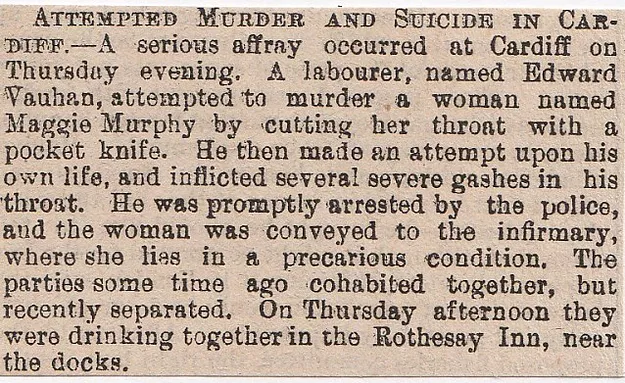
43/ Ogwen Lake Drowning, near Bangor, September 1885
Three gentlemen were fishing from a boat on Ogwen Lake near Bangor yesterday when a sudden squall arose and in making for land the boat upset. Mr Parry an architect from Bangor, one of the party, was drowned.
44/ Magor, Newport, (Bodies in Pond)August 1885
On Sunday afternoon two farmers named Booth and Duffey of Magor, Newport went with the wife and sister of one of them for a walk. The men left their relatives and proceeded to a deep pond to bathe. As they were absent a long time the women went out to look for them. Nothing could be seen of them but on the pond being dragged, their lifeless bodies were recovered.
45/ Boughspring Suicide, near Chepstow, September 1835
A young lass named Sarah Howell, a domestic servant to Captain Hall of Boughspring near Chepstow was told off by her master for having a bloke in the house the previous night. She was so distraught, that while the family were sat down eating their dinner she went and hung herself in her bedroom.
46/ Tredegar Murder, (Death Sentence) November 1902
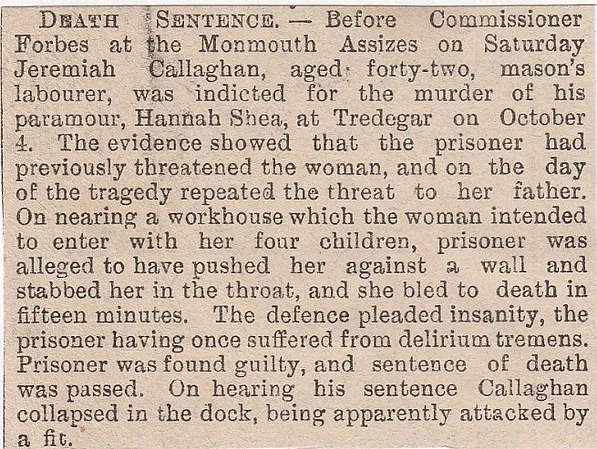
47/ Llanberis July 1885
A young man named Owen Jones was drowned on Saturday night while bathing in the river at Llanberis.
48/ Port Madoc Drowning, September 1885
During a gale yesterday afternoon on the Carnarvonshire coast, a fishing boat making for Port Madoc was capsized on the bar. One sailor was drowned and two others had a narrow escape.
49/ Aberdare, (Childs Body Found) June 1866
The dead body of a child was discovered within the walls of a churchyard. It was taken to the police-station and an inquest, later on, gave the straightforward verdict of “Found Dead”. Up until now no trace of the people who left it there have been discovered.
50/ Cardiff Wife Murder, March 1899
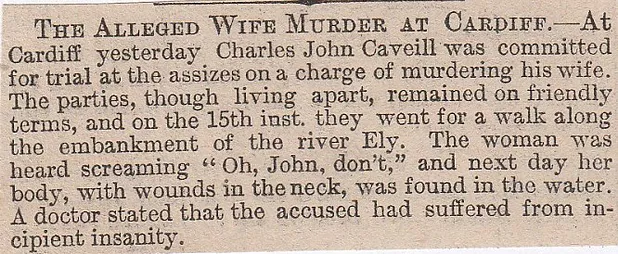
51/ Llanelli Drowning, August 1892
On Thursday afternoon a number of boys were bathing at Llanelli when Mr Frank Rowlands, the son of the Reverend Dr.Rowlands, minister of Morich Chapel in Llanelli, got beyond his depth and being unable to swim was drowned in the presence of his companions.
52/ Port Madoc, (Four Drowned) February 1885
A telegram dated Saturday reports the Spanker, a barque from Glasgow, bound from Jamaica to Liverpool, got ashore on Friday night on Harlech beach, close to Port Madoc Bar. The master, steward, boatswain and boy were drowned. The remaining seven were rescued by the Criccieth lifeboat and landed at Criccieth. The vessel is a total wreck. The Spanker was a wooden barque, 506 tons, built at Dumbarton in 1881 and owned by Mr R.Whitehill of Renfrew.
53/ Penyrhoel-Gerrig, (Squashed by Boulder) October 1841
The workman William Megrick aged thirty, working for W.Crawshay, was about to leave work when he pointed out to a fellow workman, a 500 hundredweight boulder and jokingly said: “I wonder whether this will hold till morning?” No sooner had he said that when the huge stone crushed him to death.
54/ Berthgym Murder near Holywell, November 1885
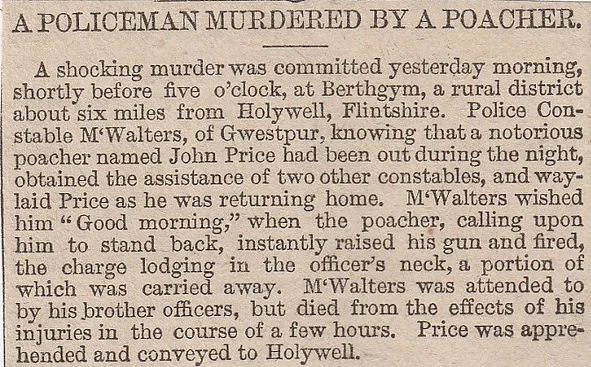
55/ Conway, (Fatal Accident) September 1885
Mr Bevitt, a late member of West Bromwich Board of Guardians, has met with a fatal accident at Conway. Mr Bevitt aged sixty-five was walking with his wife along the quay at night when, in the dark, he fell over, alighting on a pile of stones. He sustained such severe injuries that he died shortly afterwards.
56/ Plastynaston Collieries, Ruabon, (Lad’s 500 foot Fall) February 1885
A shocking accident occurred at the Plastynaston Collieries, Ruabon, yesterday. A boy named Mark Davies who was employed in the pit-bank, by some means pushed a small waggon into the pit and fell in with it, right to the bottom, a distance of 500 feet and was dashed to pieces.
57/ Aston Suicide, near Churchstoke, June 1830
A young woman from a respectable family committed suicide at Aston near Churchstoke in Montgomeryshire, in consequence of a trifling family argument. She walked out the house to go to her uncle’s house but was found the next day hanging from her apron strings. Her first effort at self-destruction was with her garters, they snapped, so she got the apron strings and hung herself.
58/ Holmes Island/Cardiff, (Six Drowned) July 1885
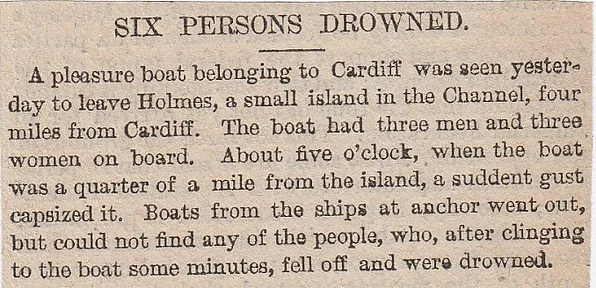
59/ Boughroad Shooting, (Radnorshire) January 1885
A railway porter named Charles Davies was shot dead at Boughroad, Radnorshire, on the Mid-Wales Railway on Friday night. He was shot by a fellow employee who took up a gun without knowing it was loaded and pointed it at the deceased, when it exploded.
60/ Abergorkey Colliery Double Fatality, March 1899
On Friday afternoon two miners, Llewellyn Powell of Treorky and William Clark of Treherbert, Rhondda Valley, were killed by a fall of roof in the main level in Abergorkey Colliery. Both men were married.
61/ Newport (Childs Suicide) May 1846
At six a.m. one morning, a boy who worked for Mr Oliver, a printer of Newport, named David Davies aged twelve who lived with his parents at Hill Street, hung himself in a privy (toilet) with a handkerchief. His sister found him and he was cut down immediately. He had a temper on him and every time he as told off, he threatened to do himself in and this stemmed from a petty argument with his brother.
62/ Cardiff/Rome Murder, December 1885
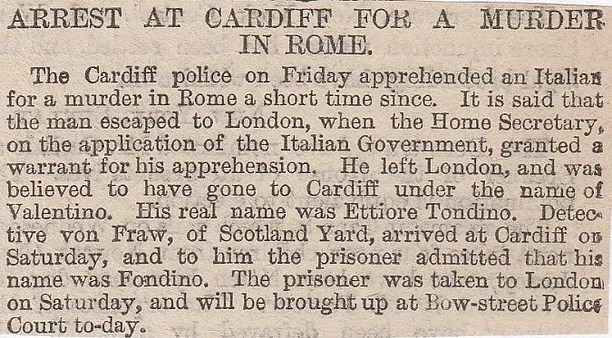
63/ Newport Road, Cardiff, (Dead Infant in Chapel) April 1890
This is the inquest into the body of an infant whose body was found at the Newport Road Congregational Chapel, behind one the doors. The autopsy suggests that the child was stillborn and the investigation continues into the identity of the parents or parties who placed the child there in the first place.
64/ Lake near Bethesda Drownings, January 1885
Two boys named Jones were drowned yesterday while sliding on the Lake above Bethesda.
65/ Rhyl, (Body Found near Pier) September 1885
On Saturday just before noon, the body of a young lady was discovered on the sandbank near the pier at Rhyl, having been left by the ebbing tide. The body was conveyed to the Queens Hotel and inquiries led to its identification as that of Miss Cooke about twenty-six-years of age who had been for several years in partnership with her sister as a milliner and dressmaker in High Street, Rhyl. Nothing is definitely known as to how Miss Cooke got into the water.
66/ Tallarn Green, (Vicar Pitchfork Death) September 1885
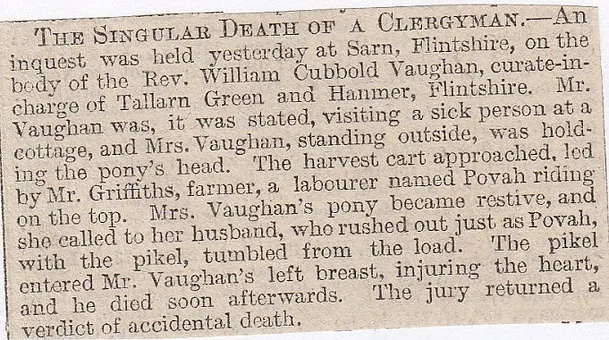
67/ Cyfartha (Crushed by Rock) September 1833
Evan Jones, a miner from Cyfartha, was working in the mine when a three-ton mass of rock fell on him and crushed him to death. He left a wife and three kids and on the night he died, she was confined of a fourth.
68/ Cowbridge (Copycat Suicide) July 1846
After his father, John Thomas had committed suicide last month, his 7-year-old son was found swinging from the same beam as his father hung himself from. It is believed that the boy’s curiosity was heightened by people talking about his father’s act of self-destruction and he had wanted to test the theory, but had got it horribly wrong.
69/ Anglesey Shipwreck, March 1899
A telegram from Holyhead states that during a severe storm yesterday morning, the French schooner Mignonne, bound from Dunkirk to Swansea with a cargo of pit-wood, went ashore on the Anglesey coast. Four of the crew got safely ashore but the captain was drowned.
70/ Hugh Lloyds Pulpit, Festiniog, (Lady Killed) August 1885
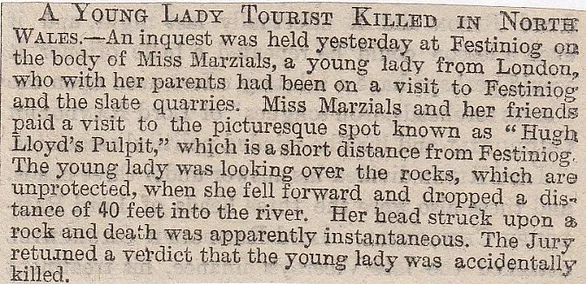
71/ Newport, (Horrific Accident) November 1839 (Did he survive?)
A lad by the name of George Wright, who was an apprentice with a Mr John Young, a Newport ship-builder, was working on the outside of a schooner while another shipwright was working on the inside of it, drilling a hole just where Wright was on the outside. When Wright bent down to look at his work, the drill came through straight into his eyeball, pulling it from the socket.
72/ Kidwelly, (Accidental Suicide) June 1832
The sixteen-year-old footman to Richard Maliphant, a Kidwelly solicitor, hung himself with a coupling strap in his master’s stable. The theory is that he was messing about with the strap and put his head through it for a joke, then became scared, had a fit and accidentally strangled himself.
73/ Cardiff Murder, December 1872
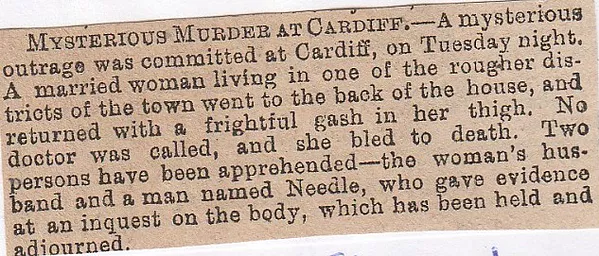
74/ Llanvaelog, Anglesey, (Body Washed Ashore) March 1878
The district coroner of Anglesey held an inquest on the body of the unknown man who was discovered on the seashore at Llanvaelog. It was thought to be one of the crew of the “Elizabeth Closterboer,”which was wrecked off Rhosneigr a fortnight ago.
75/ Kile near Fishguard (Epileptic Falls into Fire) June 1846
An awful accident occurred at Kile near Fishguard, to a young lass who lived there who suffered from epilepsy. The girl, Phoebe Thomas, was left by her father to make hay in a field next to their house, but she had a seizure and fell into the fire. When pulled out she was charred black and she has survived the accident but remains in constant excruciating pain.
76/ Ruthin Road, Wrexham, (Three Drown) January 1885
A shocking accident occurred at Wrexham yesterday afternoon. A number of boys were skating and sliding on a pond in Ruthin Road when the ice gave way. Three brothers named Robert Jones, Edward Jones and Hugh Jones, aged between twelve and fifteen years of age were drowned. The boys were sons of Sergeant Hugh Jones of the borough police force.
77/ Cader Idris, (Lady Lost) September 1885
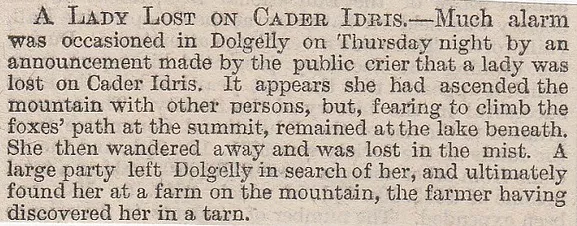
78/ Hay-on-Wye (Fatal Mill Accident) January 1843
A seventeen-year-old girl named Harris who worked at the carding-mill in Water Lane, Hay, was busy trying to do some D.I.Y. repairs to the machinery and she got tangled up in the mechanics of it. She was mangled to bits and literally cut into two pieces, causing her instant death.
79/ Boncath, (Gored to Death by Bull) July 1885
A youth named Sayce aged about seventeen has met with a shocking death near Boncath in South Wales. He was taking some cows to a field to graze, when a bull suddenly turned upon him, knocked him down and gored him in the stomach. Medical assistance was procured as soon as possible, but the poor lad died in a few hours.
80/ Alps Quarry, Wenvoe, (Three Dead at Quarry) August 1889
An inquest was held at Cardiff on the bodies of three men, George Richardson, Charles Cavill and James Wills, were killed by a fall of stone at Alps Quarry at Wenvoe. In the course of the inquiry, the Coroner rebuked the solicitor who appeared for the relatives of the deceased for his manner and tone of voice in questioning the witnesses. Verdict of “Accidental Death”.
81/ St Davids, ( Fatal Lamp Accident) December 1885
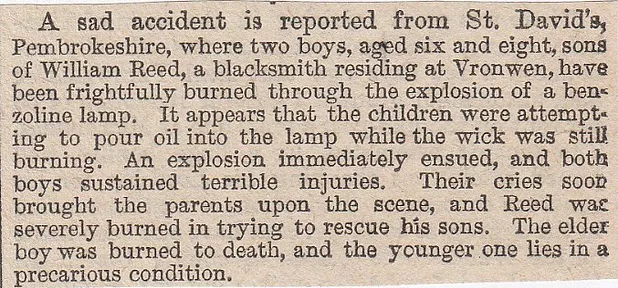
82/ Trefeilir, Anglesey, (Cart Fatality) April 1870
Mr O.John Owen from Trefeilir on Anglesey was with a servant driving a colt and cart, in the process of training the animal, when it suddenly bolted. Each man had a rein in their hands thinking they they could calm the animal down but they were thrown out of the cart onto the ground. The servant got up to see if his master was alright, but he lay motionless face down on the gravel. During the accident Owen had been run over the head by the cart and he died twenty minutes later.
83/ Trevor Rocks (Fatal Fall) February 1888
On Saturday an inquest was held at Llanymynech on the body of Edward Morris, labourer, who met his death by falling over a precipice. The deceased, who was going to work at Blodwell, took a short cut over Llanymyneck Hill and with the morning being dark he missed the footpath and fell over Trevor Rocks, a distance of fifty feet. A verdict of “Accidental death” was returned with the recommendation that the rock should be fenced off.
84/ Carnarvon Child Murder, July 1885
At Carnarvon Assizes on Saturday, Sarah Roberts, indicted for the murder of her child by cutting its throat, was declared insane and will be detained during Her Majesty’s pleasure. The prisoner after killing the child, cut her own throat and was for a long time in great danger.
85/ Maritime Colliery, Pontypridd, (Colliery Deaths) April 1899
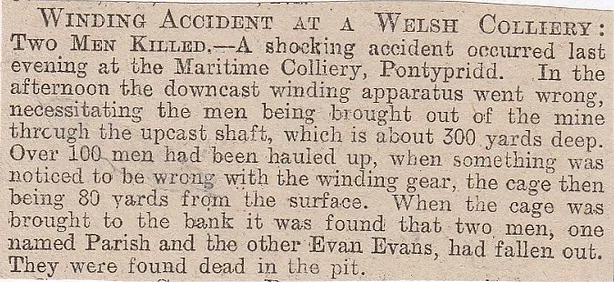
86/ New Inn Public House, Treherbert, (Dynamite Explosion)April 1885
A shocking accident occurred last evening at the New Inn public-house at Treherbert, Rhondda Valley. A young man named Morgan, the son of the landlady, was holding over the fire a saucepan containing dynamite for the purpose of tempering it, when it exploded, shattering his arm and leg and killing his mother who was standing near him. The house was completely wrecked.
87/ Carmarthenshire, (Hemlock Poisoning) , ? 1883
Much excitement prevails in the outskirts of Carmarthenshire by a wholesale and fatal case of poisoning which has just occurred in the district. Several children while going home from school ate some leaves (??) which they found in the hedge-rows. The leaves were those of hemlock. One child was immediately taken ill and died soon after from the effects of the poison and another child has since succumbed to the same cause, while others are more or less seriously ill.
88/ Huntsholm Disembowelling, (Monmouth) May 1847
A chap named William Watson who worked for a Mr Ambury of Hunstholm, was at his work when he was coming down from a hay mow, which he had been cutting some of it, then tried to ease himself down by using a pike, he slipped and fell onto it, with the prongs entering his bowels, which in turn pierced his intestines. (Did he make it?)
89/ Minerva Mines near Wrexham (Two Killed) August 1885
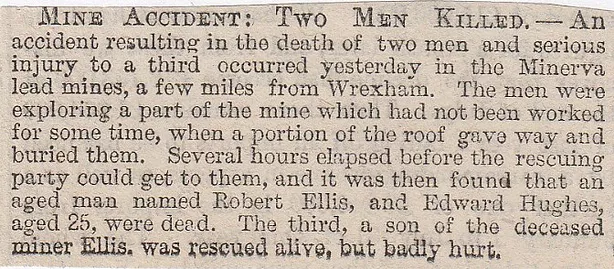
90/ Bodorgan Railway Station Fatality, Anglesey, March 1878
Mr William Williams, a farmer residing at Tyddyn Bottwm near Bodorgan, was with the lad who was employed by the miller at the railway station, shoving a truck into the sidings. All was going well until a Liverpool goods train shunted another truck and the two were squashed between them both. Mr Williams hung onto life for a few more hours, then died. The boy is doing fine.
91/ Pembroke, (Broken Neck) December 1885
A shocking accident occurred near Pembroke on Christmas Eve. Mr George Young, one of the leading farmers and deputy receiver of wrecks of the district, was proceeding homewards after dark when his trap came into collision with another trap, which was going in the opposite direction. Mr Young was thrown violently out and when picked up it was found that he had broken his neck in the fall and life was extinct.
92/ Simolde Dyllvan Copper Mine, (Fatal Explosion) May 1834
A miner who worked at the Simolde Dyllvan Copper mine was ramming down a charge when it prematurely exploded taking the forehead of the miner with it.
93/ Fairy Glen Fatality, near Bettws-y-Coed, August 1885
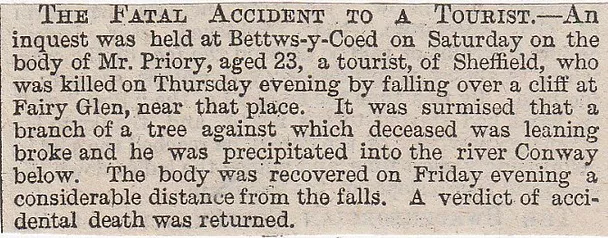
94/ Penmaen (Gower) (Church Discovered) July 1861
The excavation of sand from near the Reverend J.K.James’s house unearthed the remnants of a long-buried church. The workers who were digging were moving the earth for the foundations of a new Gower Union Workhouse and since finding the building, the Reverend has been overseeing the rest of the excavations. It is only a small church, with the font and communion table also dug up and also an incense burner was found. It is thought to be centuries old. (Was it left unearthed or buried again?)
95/ Vauxhall Colliery, Ruabon, (Hundreds Buried) March 1899
An estimated three hundred men were imprisoned in a pit accident at Vauxhall Colliery at Ruabon. The accident to the pit cages was due to the guides breaking. The lives of the miners are imperilled, as at a late hour last night they were still imprisoned in the mine and hundreds have flocked to the pit-bank, eagerly awaiting news to see if the cages have been repaired in order to enable the men to be raised to the surface. There are approximately three hundred men buried at this time.
96/ Swansea Abortion Death, July 1895
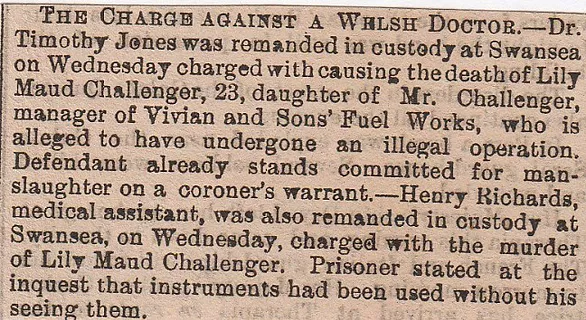
97/ Llanelli, (Infants Body Found) October 1876
Between the Carmarthenshire Dock and Copperworks Dock, Llanelli, the decaying remains of a baby girl were discovered on the bank of slag waste. It was wrapped in a section of a woman’s dress, which suggests it was alive when put there but must have died of suffocation from the way it was tied. It is believed that the baby was like this for a couple of days while it lived, then dropped into the water, where the tide washed it up to where it was found.
98/ Pwlldu/Abergavenny, December 1876 (One Family has Three Suicides in a Month)
John Davies aged twenty-four, son of the surveyor to the Blaenavon Company, killed himself by drowning. He lived at Pwlldu and was seen in bed by his sister on Sunday morning, as she went to light the fire. He then got dressed, calmly walked out of the house with no one noticing and drowned himself in the pond near the house. A month ago, his father committed suicide whilst he was an inmate at Abergavenny Asylum. Then his brother, who went to Abergavenny to pay the funeral bill, threw himself under a train at Abergavenny Railway Station the week after.
99/ Llandudno Drowning. August 1885
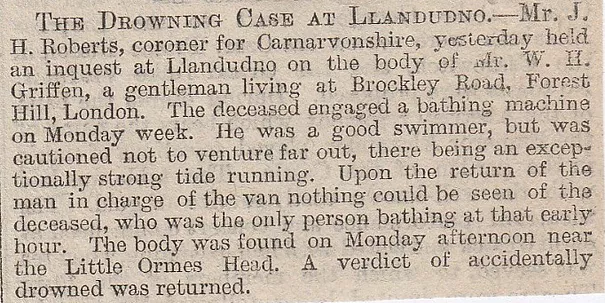
100/ Brecon Hunting Fatality, April 1885
A coroners jury have returned a verdict of “Accidental Death” on the body of Mr Frank Green Price, son of Sir R.Green Price, M.P. who died at Brecon Infirmary from the effects of an accident in the hunting-field. The deceased was at Brecon races last week and while riding his horse, fell in clearing the hurdles and received fatal injuries. The jury passed a vote of condolence with Sir Richard and Lady Green Price.
101/ Old Cemetery (Cardiff) (Illegal Burial) January 1879
A box was found in the Old Cemetery with the remains of an infant inside, supposedly put there illegally. The person who is in charge of the cemetery has no record of it being buried and has no death certificate either. The child was buried only a handful of inches from the surface, so it is clearly not the normal depth of grave that a gravedigger would adhere to.
102/ Cardiff Cemetery, (Child Homicides Buried Illegally) January 1885
Another one similar to the above and this was found by Thomas Pullen, who was in the Catholic section of Cardiff Cemetery when he spotted a roughly made wooden box wrapped in brown paper, laid in a grave. He thought it looked suspicious, so he went to get a policeman. The policeman opened the box and inside were two bundles tied up with bits of an old blanket. In those were the two bodies of baby girls. They were not decaying, so had died recently. The box resembled that in which groceries are usually in; an orange box for example. The umbilical cord was cut but not tied up and the chances are that they bled to death because of this. The police are treating this as a double homicide and are looking for evidence as to the mother of them.
103/ Aberystwyth Murder, June 1st, 1885
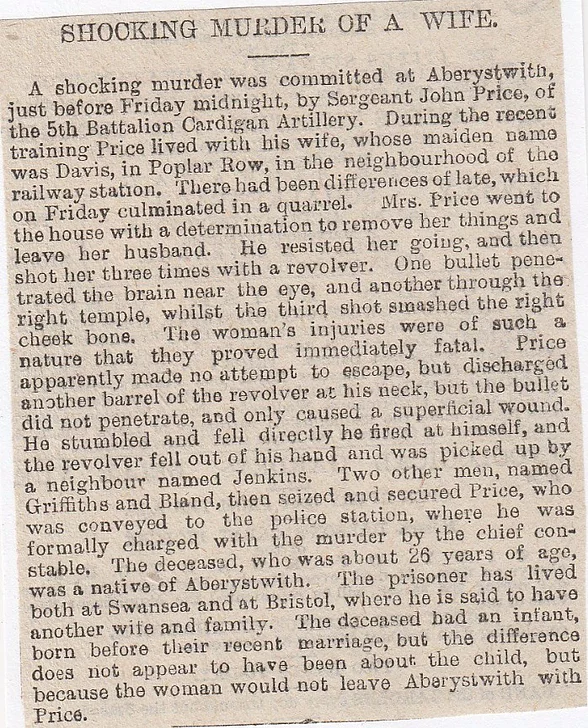
104/ Aberystwyth Murder, July 20th, 1885
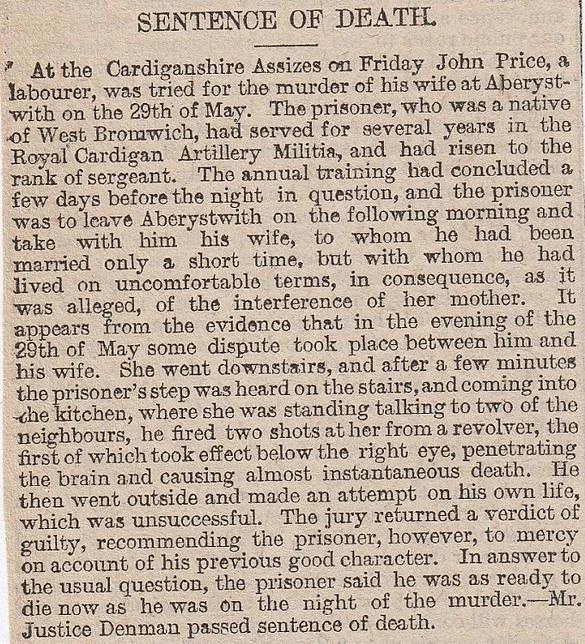
105/ Aberystwyth Murder, August 3rd, 1885
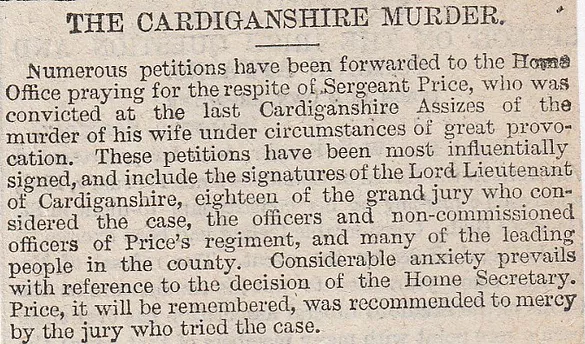
Aberystwyth Murder, August 4th, 1885
The Governor of Carmarthen Gaol received a telegram last night from the Home Secretary respiting John Price, a sergeant in the Cardigan Militia, who was to have been executed tomorrow (Wednesday) for the murder of his wife at Aberystwyth in May last.The telegram intimated that a letter would follow.
106/ Rhyl Station, (Lift Death) October 1910
Joseph Jones aged thirteen, the stepson of Thomas Evans, No.2, Bedford Place, was killed when he became entangled in the luggage lift on the north platform at Rhyl Railway Station. There are several unanswered questions at this time, such as how did he get in there, what was he doing in there and how he got the lift to move, is another. He must have seen it open and unmanned so thought he’d play about with it for a while. When it was on its way up, he tried to climb on the platform but he miscalculated the speed of the lift and he became wedged between the edge of the floor and the descending railings which bar the opening at the bottom when the left is in motion. Part of his face was ripped off and he was badly mutilated, so death must have been straight away. Rescue workers were nearly an hour getting his little corpse out of the lift shaft. He sold newspapers in the evening, which explains why he had dozens in his possession when found.
107/ Pontypool (Head Squashed in Machinery) February 1833
A lad of fourteen years of age was with another lad who had a cart laden with vats from Langwm, which were unloaded at the Company’s stable, where a horse propelled machine was going around. The curiosity factor was ten on the young man’s scale, so he looked through a gap in the wall, when a beam attached to the machinery jammed his head against the wall and crushed it to bits.
108/ Swansea Pierhead Murder (West Pier) December 7th, 1885
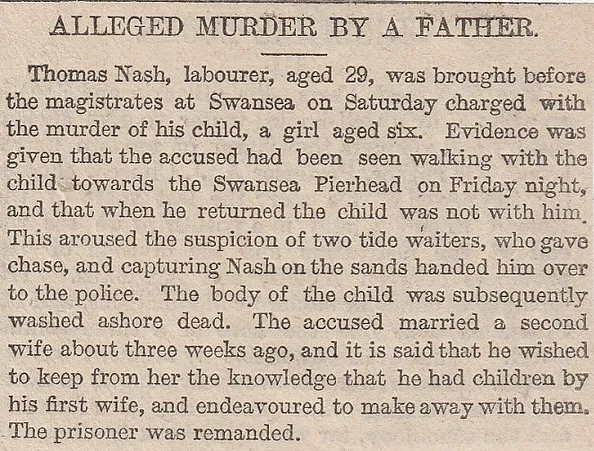
Swansea Pierhead December 8th, 1885
The coroner’s jury at Swansea yesterday, returned a verdict of wilful murder against Thomas Nash, Corporation labourer, for throwing his daughter aged six years over the side of the West Pier on Friday night last.
109/ Usk Church Suicide, August 1881
The churchwarden of Usk church, W.H.Slade, was walking through the churchyard when he spotted 80-year-old William Lewis sitting up near the centre of the churchyard, against some railings around a tomb. Thinking he had been drinking and passed out, he went closer. On getting to him he saw that a cord was tied to the railings and then around his neck, hence the sitting position, as it was not high enough. He had told some children in the churchyard to leave as he was tired and wanted to sleep, so they did. He had a prayer-book next to him. The body was still warm.
110/ Tenby Infanticide, February 1894
There was quite a buzz in the town when word got around that the body of a newly-born infant was found in a cistern at No 4, The Croft, which was the home of Captain Payne. This is normally when you look at the domestic staff, as it is usually one of them that has got rid of an unwanted birth. This occasion was no different and Emily McKay the Payne’s maid said that a fellow servant, Kate Hickley, who was the cook, had complained of being ill and that later on, she had suddenly become thinner. Sherlock Holmes was not needed! Another house-maid, Helen McSweeney said that she saw her put a parcel under the press in the kitchen, then went out the back. When McSweeney saw footprints on the toilet seat, she checked the cistern. That was cause to tell someone and then police were involved, then the child was discovered in the water closet. (Did she go to prison?)
111/ Crwys Road, Cardiff, (Infants Body Found) July 1909
David Archer saw a bundle wrapped in a shawl in a lane at the back of Crwys Road in the Cathays area of Cardiff. He opened it and found the corpse of a little girl, badly decomposed, with death taking place some time ago. It was estimated to have been dead for around eight months. This was a popular area for kids playing about, so how it hasn’t been discovered before now, is amazing.
112/ Swansea Murder, August 18th, 1885
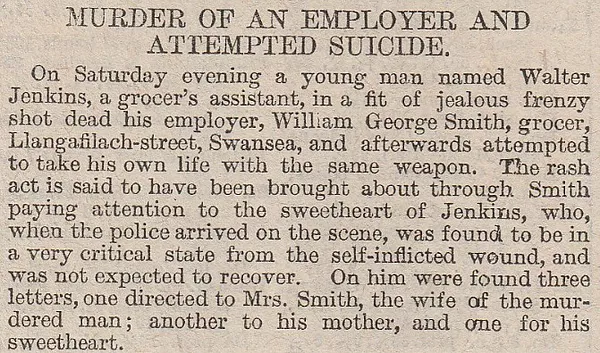
Swansea Murder August 22nd, 1885
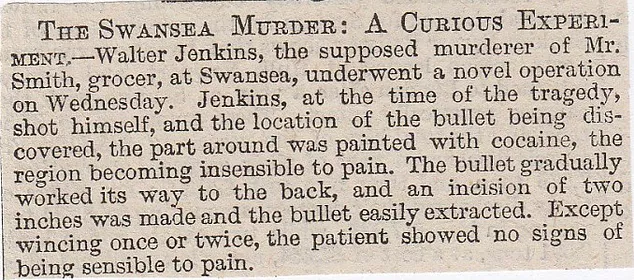
Swansea Murder, August 25th, 1885
The inquest into the death of Mr W.G.Smith, a grocer of Swansea, who was shot dead in his house on Saturday week, terminated yesterday in a verdict of wilful murder against Walter Jenkins, the deceased’s assistant. Jenkins, who is suffering from a bullet wound supposed to be self-inflicted, is lying in a hopeless condition.
Swansea Murder, October 1st, 1885
Walter Jenkins, aged twenty-three, has now recovered from his self-inflicted wounds and was yesterday formally charged by Swansea police, with the murder of his master, Mr Smith, a grocer of Swansea. Since the murder, the accused has been under medical treatment.
Swansea Murder, November 7th, 1885
At Swansea Assizes yesterday Walter Jenkins, who was found guilty on Thursday of the manslaughter of his employer, William Graham Smith by shooting him in August last, was sentenced by Mr Justice Manisty to fifteen years penal servitude.
113/ Llanerch-y-medd Windmill Deaths (Anglesey) February 1841
Ann Jones was taking some oats to the mill and was delivering the sacks to the warehouse when she ventured a bit too close to the sails of Llanerch-y-medd Windmill. Her head and the sail collided, slashing a massive cut wide open. She died immediately. This wasn’t the last person to die at the mill that week, as a child of five years of age was also struck by the sails of Llanerch-y-medd Windmill and died at the scene of the accident. Both cases were viewed to be “Accidental Death.”
114/ Pontypridd Shooting, September 1885 (Did any of the girls die?)
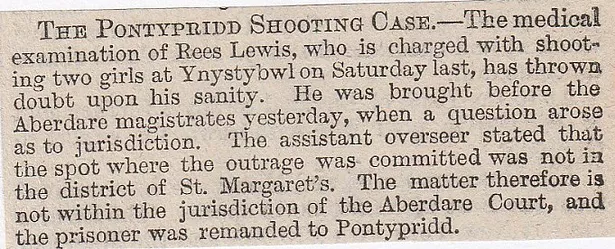
115/ Llanwern, Newport, (Naked Body Hanging in Woods) January 1881
Near to the place where 27-year-old Eliza Waters was found dead and the husband was accused of her murder late in 1879, another body, this time a man, was discovered in a wood, hanging from a tree. He was completely nude and had hung himself with a section of rope. He was estimated to have been suspended there for a few days as his clothes were damp and had frost on them. He was identified as a local carpenter by the name of George Morris. (Anything to do with Waters murder?)
116/ Swansea Pier Suicide, July 1880
A young confectioner’s assistant named Charles Edward Holcombe only nineteen, killed himself by jumping off the pier near the lighthouse at Swansea and drowning. The un-Welsh name is because he originated from Bath in Somerset. His mate David Jones was ambling along with him on the pier at around 9-30 p.m. when he suddenly walked away and he heard the words “Goodbye Dai”, then a splash in the water. The lighthouse keeper threw him a lifebuoy but he never tried to grab hold, suggesting he wanted to end it all. He was fished out twenty minutes later but it was too late, he was dead.
117/ Ruabon, (Fatal Quarrel) April 1885
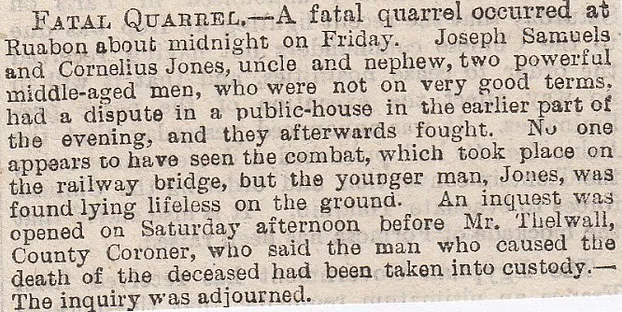
118/ Aberdare Suicide, November 1837
A forge engineer at the Aberdare Iron Works, Evan Howell, killed himself by hanging from a low beam in a cow-shed at his home. The reason for his suicide is unknown, as he was earning a good wage, nice home, plenty to eat and he and his missus got on like a house on fire. He leaves his wife and his five children to fend for themselves now.
119/ Worcester Street, Brynmawr, (Infants Body in Sewer Pipe) April 1867
The body of an infant was discovered in a sewage-pipe at the back of Mrs Chamberlain’s house in Worcester Street in Brynmawr. Thinking the pipe was blocked with the usual gunk, it was checked out and then the little corpse of the decomposing child was found. The coroner said it was nearly impossible to determine whether it had been alive for a period of time, or was still-born. The police are trying to find a clue as to the parentage but as yet nothing has turned up.
120/ Llandilo (Anglesey?) (Accidental Shooting) July 1836
An accident at a farmhouse in Llandilo resulted in the death of a 15-year-old domestic servant. She and another servant of the same age as her, had been left in charge of the farm while the owners went out. The young girl was sat reading a Bible with a kiddy on her knee, when the lad started to mess about with the firearm, then it went off and the bullet embedded itself into her neck/throat area, killing her almost immediately. The servant realising what he had done, was going to kill himself but was secured and taken to Beaumaris Gaol to await his fate.
121/ Queensferry Ferry Accident, January 8th, 1885
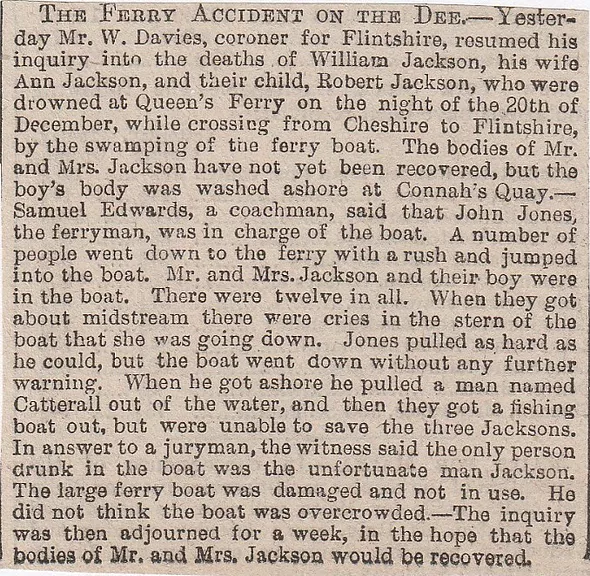
Queensferry, January 22nd, 1885
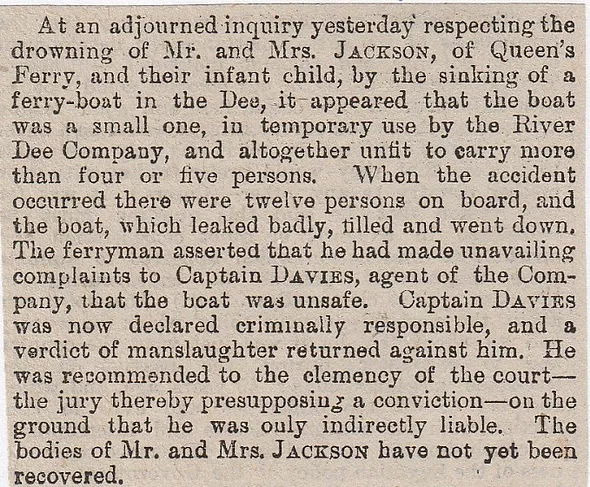
Queensferry, January 27th, 1885
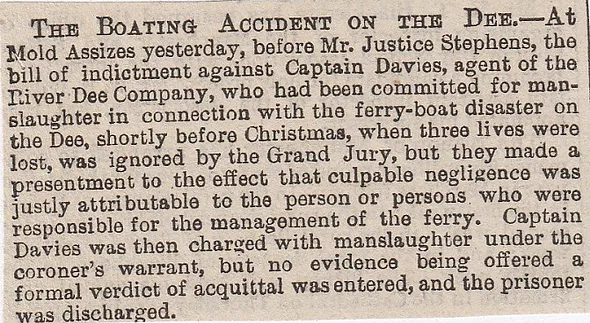
122/ Pontarddulais, Carmarthenshire, (Sliced Open Stomach) July 1846
John Moore from Merthyr committed suicide in a most original way possible, at Pontarddulais in Carmarthenshire where he was doing a bit of recuperation. He had bowel pains for quite a while, but one day he had enough and he just sliced open his bowels and pulled them out, then also tugged out a section of his intestines and he let them all drop out. After all this, you’d think your body would be in shock, well it was getting that way. He tried to slice open his throat to finish it all off, but couldn’t manage it. His last sentences stated that it was because of the pain he was in, that caused him to do this to himself.
123/ Portskewett Station Fatality (Monmouthshire) November 1909
A domestic servant named Ethel Parry, only sixteen years of age, who worked for a Mr Parsons at Southbrook Farm, went to meet a passenger at Portskewett Station. She was crossing the line to go back to Sudbrook when an express clattered into her and sliced off her legs and smashed her skull into fragments, leaving the brains spread over a wide area. The autopsy revealed that no bone in her body was left intact, and it was recommended a bridge be installed at Portskewett Station.
124/ Cwm Bridge near Bridgend (Decomposing Suicide) November 1876
A man named Gibbs was in a field at Cwm Bridge, when he stumbled across the corpse of a man hanging from a tree in a terrible state of decomposition. It is surmised that he had been there for some weeks as the flesh on his face and hands had been literally eaten away. The clothing too was decaying and a couple of pawn tickets were found with the name “Stephen Lewis, Hirwain” on them. They had been used at Eli Joseph’s shop in 17, Lewis Street, Aberaman and Edward Barckle of Aberdare.
125/ Morfa Colliery Explosion, March 1890
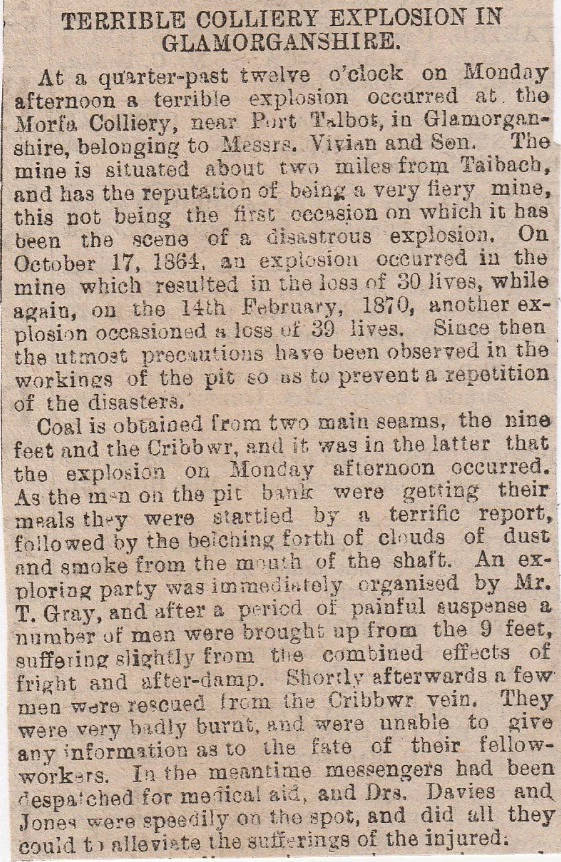
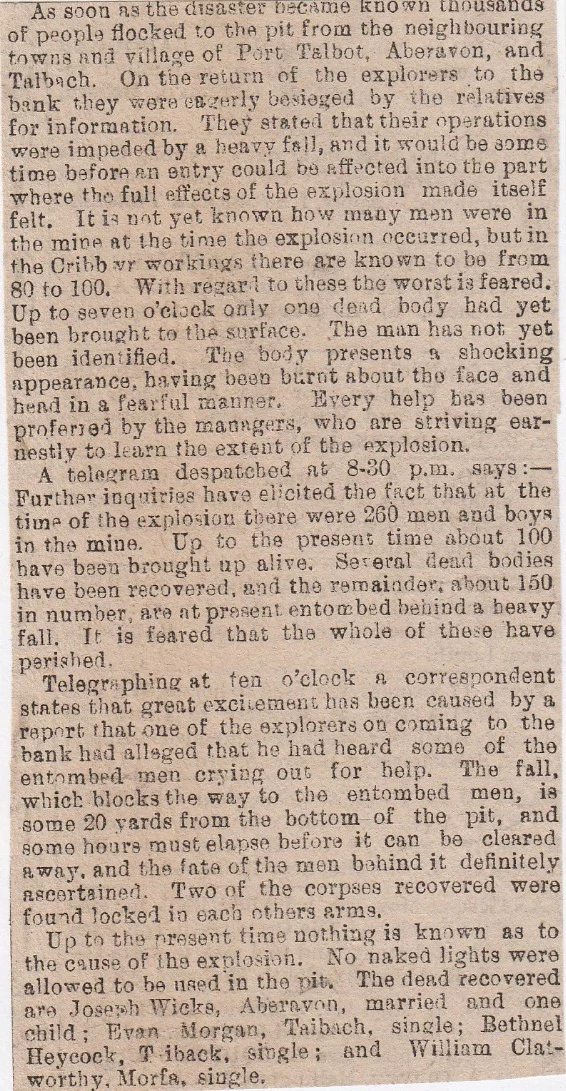
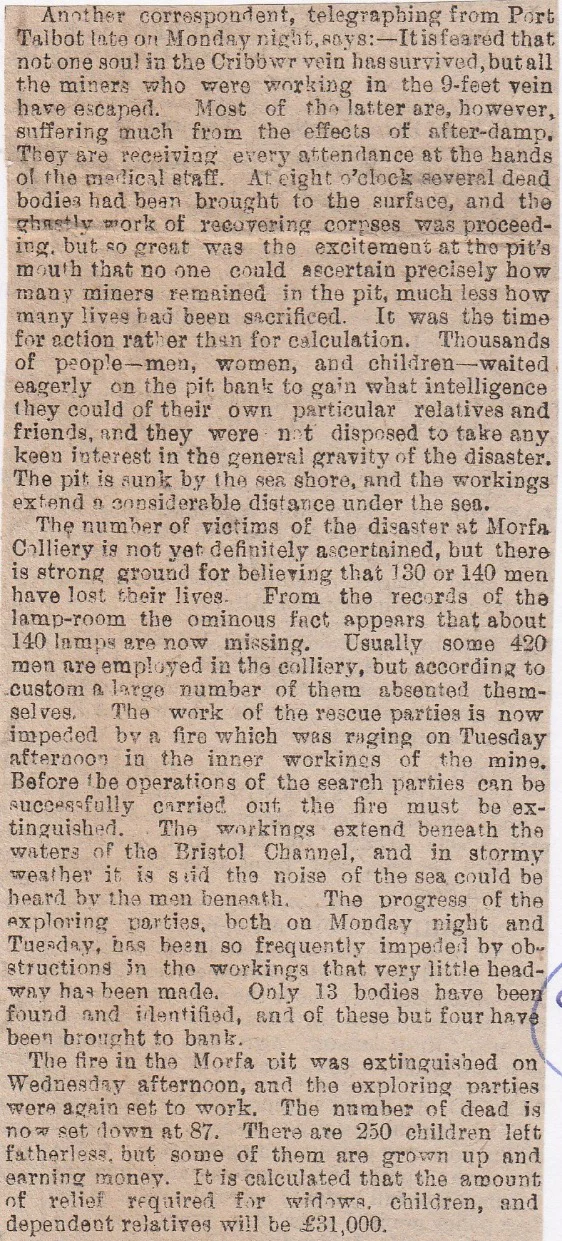
The death toll, in the end, was eighty-six dead.
126/ Trosnant near Pontypool, (Sliced Own Tongue Off) June 1832
A freaky suicide took place at a lodging-house at Trosnant near Pontypool, when the deceased cut a couple of inches from his tongue and died the next day. He was found sitting on his bed, drenched in blood, only ten minutes after he made the first slice. He was attended by medics but they just managed to prolong his life by a few hours. (What was his name?)
127/ Cyfarthfa Manslaughter? April 1835
Two men were having a scrap at Cyfarthfa, one was William Morgan aged nineteen and the other was John James. While the fight near the river-side was well under way, another bloke smacked William Morgan and he picked up a stone to throw at him, but he instead hit an eleven-year-old boy named James Fox on the temple with the stone. The young chap died of his injury within the next few days.
128/ Llanddowror Mill, Carmarthenshire, (Epileptic Seizure into Mill Wheel) November 1838
The daughter of David Wilkin of Llanddowror Mill, Miss Margaret Wilkin, met with a fearful accident at the Mill. It appears she suffered from epilepsy and was of weak intellect too, and while she was washing the spuds near the wheel of Llanddowror Mill she had a seizure and fell into the wheel. Her father rushed to the spot when the mangled remains of his daughter came into view. The wheel was stopped but she had already been through the mill several times and was already extinct.
129/ Holyhead Steamer Missing, Anglesey, January 1885
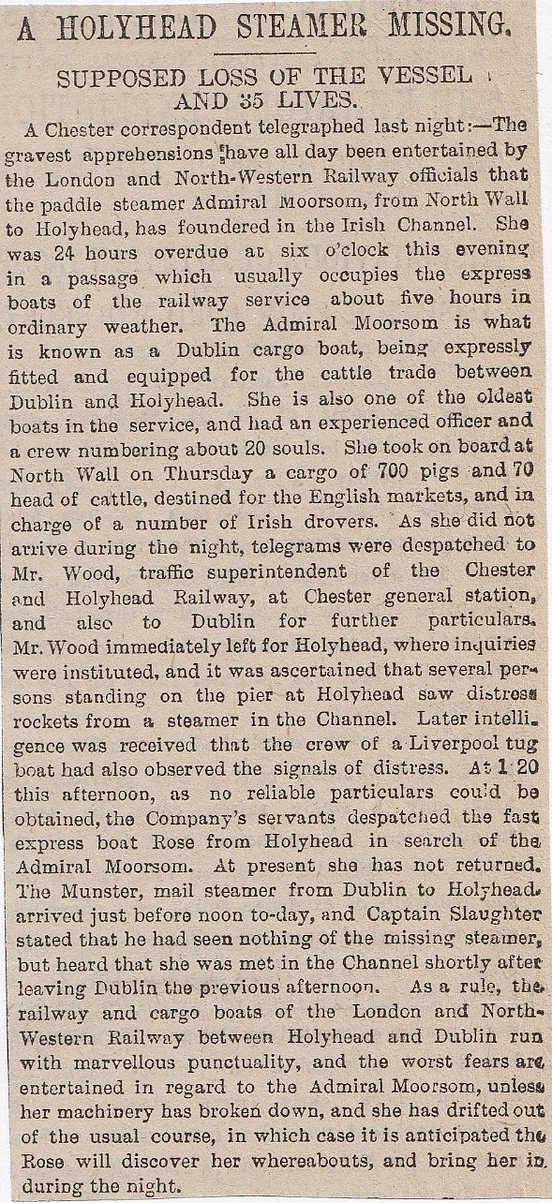
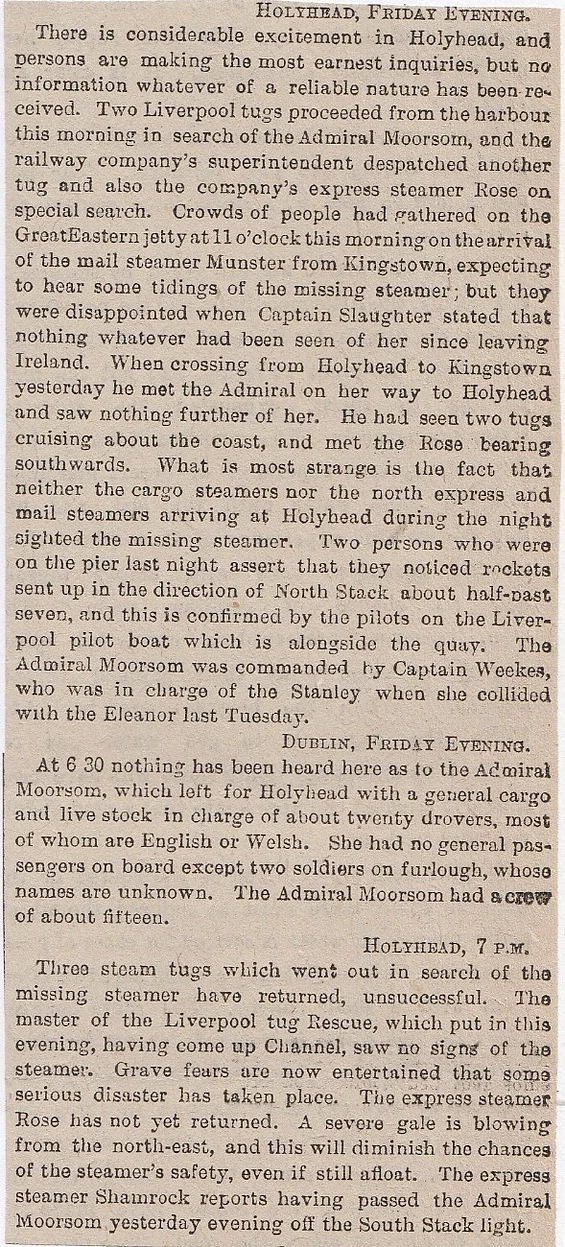
130/ Beaufort Iron Works ((Burned to a Cinder) October 1846
A disturbing accident took place at the Beaufort Iron Works when Thomas Jones, an assistant filler, was throwing some cinders into the furnace when he overbalanced and fell in. He was would have been a pile of ashes within a few minutes, such was the heat and temperature of the crucible. No trace of his body was found. His mother’s first husband died in an explosion of molten iron in a metal-works nearby and his father, the second husband of his mother, lost an eye and one of his brothers was burned to death on a cinder tip.
131/ Ystradfellte Cave Suicide, February 1893
A couple of men were exploring the cave at Ystradfellte in Breconshire when they were approximately fifty yards into it, they found the dead body of a man who had killed himself. He was about thirty-years-old and a strapping six-footer, wore a black felt hat, grey coat and dark trousers. He had some coins on him, an aluminium watch and a miniature boat on a chain. He shot himself with the Colt revolver that lay by his side, through the rib-cage into the heart. He was badly decomposed and probably committed the act several months ago. Identity as yet unknown.
132/ Aberdare (Tragic Fatal Accident) May 1859
An accident at the Llwycoed lime-kilns near Aberdare led to the death of a young man. William Thomas was working there and while burning lime, then having fed the kiln, he climbed on top to level the stones. Underneath was heavily calcined and the mass gave way under his weight, propelling him into the burning mass below. Upon impact, he began to scream and tried to wrangle his way out. Despite aid from fellow workers, he just sank into the fire. Hie remains were sought and only a charred mess was brought out.
133/ North Wales Murder, September 24th, 1885
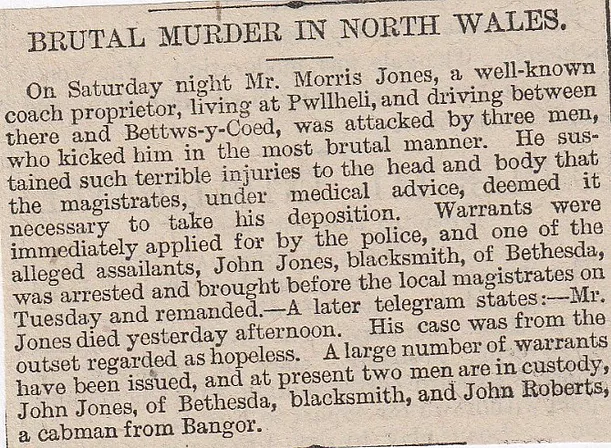
North Wales Murder, October 1st, 1885
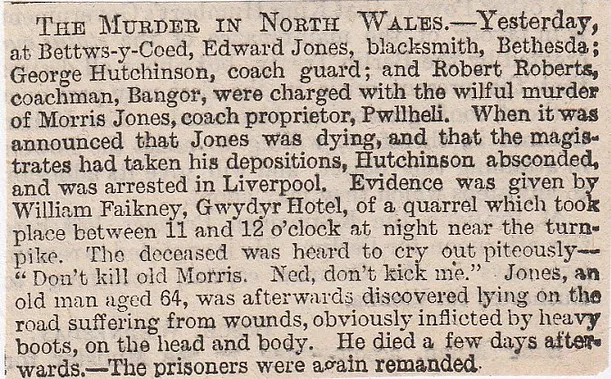
North Wales Murder, October 5th, 1885
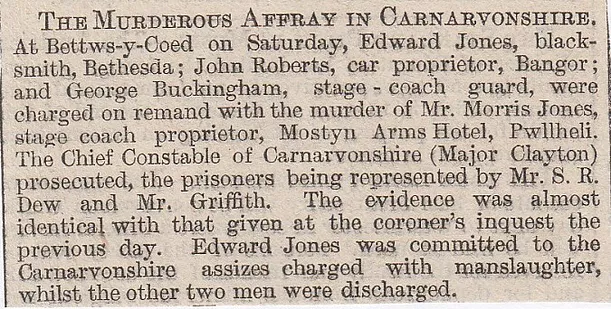
134/ Cardiff Station, (Infants body in Toilet) August 1898
A porter named Franks, who worked at Cardiff Station lavatories, was told of the ladies toilets being blocked up. He went to sort out the problem and found that the leg of a newly-born was the object that was bunging up the pipe, which had been severed in a rough way from the trunk. A plumber and police were sent for and they found more pieces of the child, the other leg and some entrails. The police surgeon determined they were the remains of a baby girl and this had been done with a hatchet or similar cutting implement. Also, the child must have been put down there a few days ago, as the pieces had worked themselves down to the pipe where they lodged. It was a Bank Holiday the previous day, so it can’t have been then, so presumably the day before.
135/ Llangerniew Murder, March 1899
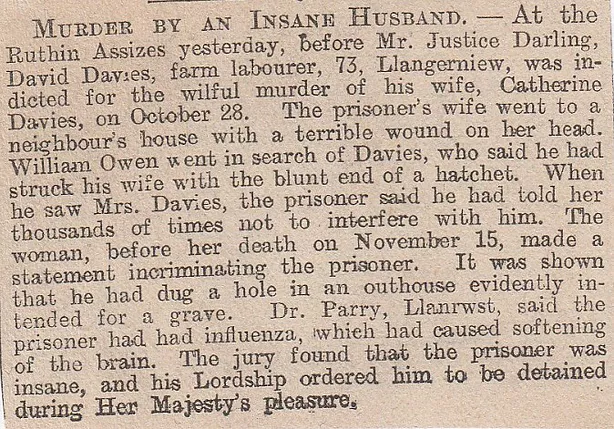
136/ Aberdaron/Bardsey Island, January 1889 (Haunted Farmyard)
Bodurdda Farm near Aberdaron and Bardsey Island has been the scene of some extraordinary happenings, thought to be ghosts or phantoms. The cowman went to milk the cows one morning when he saw them all running about the place. The bull knocked him over and gored him in the cheek, leaving him at death’s door. Police were sent to observe the place and during the night, three of the cow-shed doors opened and slammed shut all at once. The officer ran out saying that nobody was nearby when the doors slammed. Also, strange sounds have been heard at the property.
137/ Swansea Fatality, October 1896
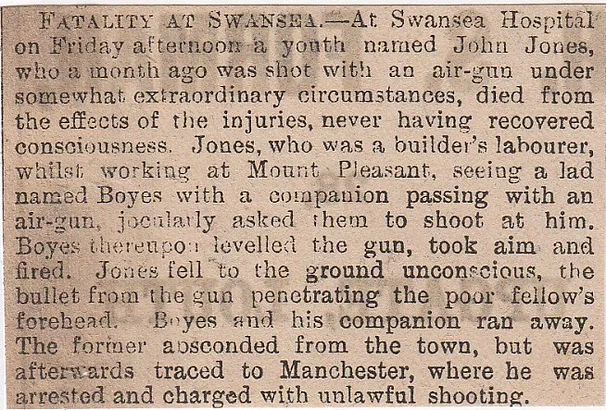
138/ Newport Manslaughter, September 1885
A shocking murder was committed on Friday night in Newport. During a quarrel between Margaret Driscoll aged sixty-two and her daughter, the latter picked up a paraffin lamp and threw it at her mother, whom it struck on the right leg, severing the main artery. Medical aid was summoned but the woman bled to death. The daughter, a single woman aged thirty-one, has been arrested.
139/ Llandudno Fatality, August 1892
During a rush of visitors at Llandudno on Monday to see a brig which was in distress near Little Orme Head, a man named Robert Whalley of Manchester, was knocked down by the lifeboat waggon and killed.
140/ Point Lynas, Anglesey, August 1892
The steamer “Architect” of Liverpool, put into Holyhead on Sunday afternoon and reported that Joseph Proctor of Birkenhead, an able seaman, fell from the mast-head when the vessel was off Point Lynas in Anglesey and was killed.
141/ Barry/Cardiff Boating Deaths, August 1892
Thomas Rice of Barry, took a boat called Lalk Jane and towing another boat went for a sail on Saturday afternoon. He reached Cardiff without mishap and took on board his sister-in-law. Later in the evening, the boats were found bottom up with no traces of the occupants.
142/ Milford Haven (Attempted Murder in Court) October 1897
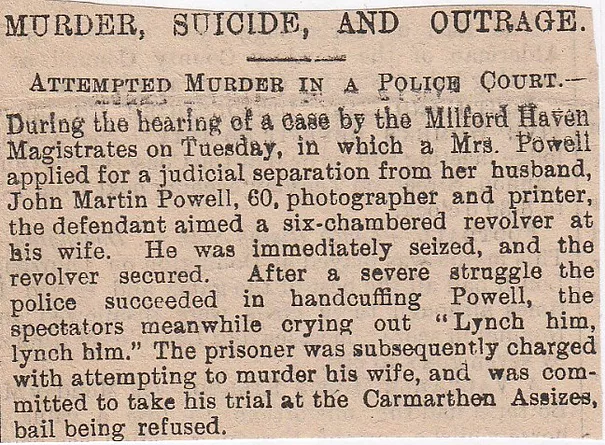
143/ Abernant Works Fatality, July 1839
One night at the Abernant Works, Thomas Davies a 19-year-old rougher-down was caught in the roller and whirled around the spindle, with his head, an arm and a leg, being ripped from his body. The mangled corpse of young Davies was taken out and sent to the mortuary and after the inquest jury had viewed his body, he was buried in the evening. His father has worked at the same factory for thirty-three years.
144/ Blaenau-Ffestiniog, (Mountain Tragedy) March 1898
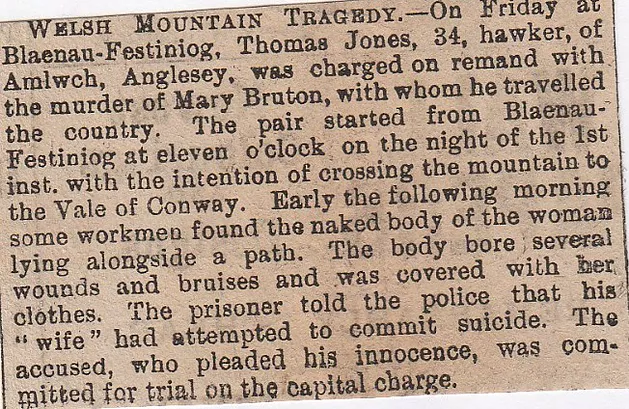
145/ Bagillt Suicide, near Holywell, (Near Chester) October 1877
This is the gory suicide of fifty-three-year-old Elizabeth Roberts, whose lifeless body was found at the bottom of a shaft at Wern Colliery, Bagillt near Holywell. Her husband Henry told of how she had depressed of late and had gone to bed on Thursday evening as normal, but when he woke up at three a.m., he found his wife had gone. He sent the two sons to go and look for her but they were unsuccessful. Then at about five a.m., Robert Williams, a fireman at the colliery, went to a furnace at the bottom of Powell’s shaft which was over 120 yards deep and saw her lying in a pool of blood. She was decapitated, had an arm missing and her eye was knocked out. Roberts had left her bonnet and shawl on the railings outside and managed to scale an eight-foot safety fence when she did it.
146/ Rhondda Colliery, (Three Killed) August 1892
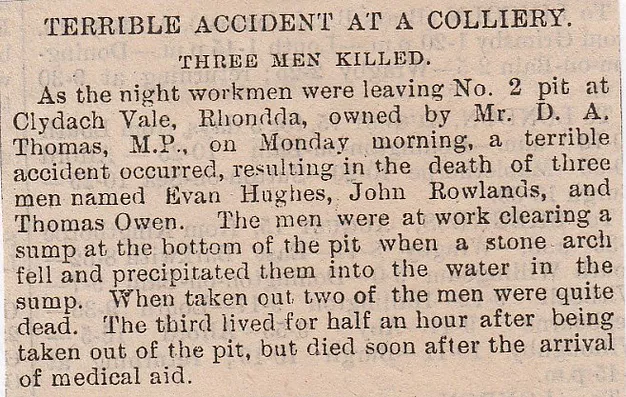
147/ Brynmawr (between Abergavenny and Merthyr) (Suicide Premonition) November 1867
George Whatley, a twenty-year-old collier, was found drowned in a pond known as Black Pond, approximately half a mile from Brynmawr which is a feeder for Nantyglo Works. Last week at the Petty Session, Harriet Spratman was in court to prove that Whatley was the father of their child and how he owed them child support, but he didn’t turn up. He was meant to leave home, which was next door to the Brecon Arms pub, to go to work, but he wasn’t seen that day. That night his father dreamed that his son was drowned in the Black Pond, then telling his son-in-law the next morning they decided to act on the dream and went to take a look. Lo and behold, the lad’s cap was discovered on the pond-side and when it was dragged by police, they snagged his body and brought it to the surface. As suicides were not given normal Christian burials, he was buried at Brynmawr Cemetery at night-time, but around 200 villagers and friends turned up to see him interred.
148/ High Street Murder, Swansea, June 1899
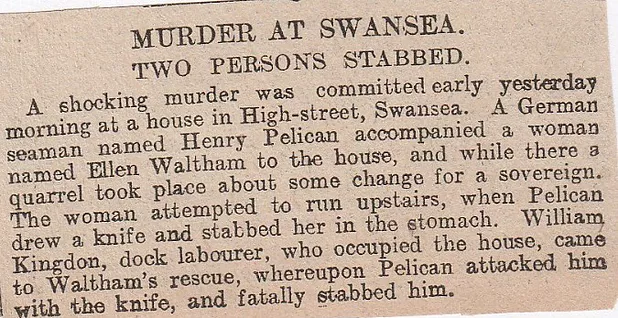
149/ Coed Alice Wood Suicide, Panteg, November 1857 (Weird!)
One afternoon, a lad was walking through Coed Alice Wood when he saw a man hanging from a tree by a handkerchief. He ran off scared to death, to George Joshua. He then went back with him to the crime scene. The man was identified at Nathaniel Betts, who was fairly well-known around the area, but hadn’t been right in the head for quite a while. Here’s the bit I get confused with! He was illegitimate and brought up by a woman named George (he was better known as Nathan George) and when her husband died a few years later, she married the deceased. She married her adopted son? No wonder he hung himself, he must have been screwed up. The autopsy revealed a gash in his throat which he had done himself, prior to hanging, just to make ultra sure of not being saved. There were no marks on the ground, which would indicate a scuffle and possible murder.
150/ Abersoch Lead Mines, (Three Killed) February 1885
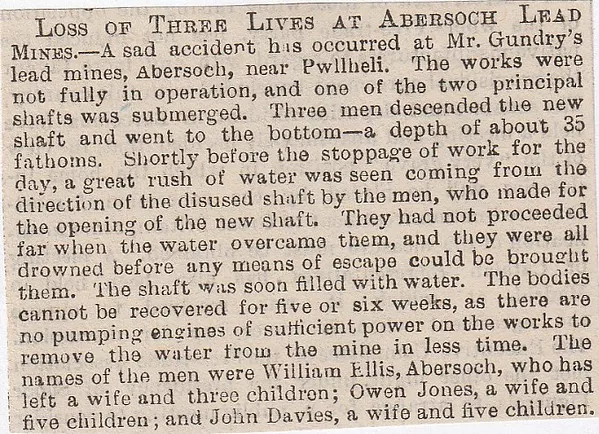
151/ Kidwelly, (Abandoned Child at Pub) December 1850
This is an extraordinary story from Kidwelly. The omnibus stopped at the Pelican Inn, from Swansea and a nicely-dressed woman holding a baby got off the bus. While they were changing the horses the woman went into the Castle Inn and sat by the fire, then asked the landlady, Mrs Thomas, to hold her for a minute while she got something from the bus. She did and after a few minutes everybody got on the bus and left the place, with no sign of the woman returning for her baby. When they asked about the woman, it appears she had got back on the Carmarthen carriage and headed off that way. Mrs Thomas looked after the baby for a time but then got a nurse to take care of it, as she had an inn to run. Nothing more was heard of the mother until Christmas Day, when a box arrived with baby linen and twenty sovereigns in it. If this wasn’t a surprise, then a woman turning up wanting the baby was another. She was a nurse-type of employee and the child was whisked off to who knows where. There was a rumour circling Kidwelly that the woman had an illegitimate child and entrusted Mrs Thomas when she had no other option.
152/ Churchstoke (Montgomery) (Farmer Burned to Death) May 1899
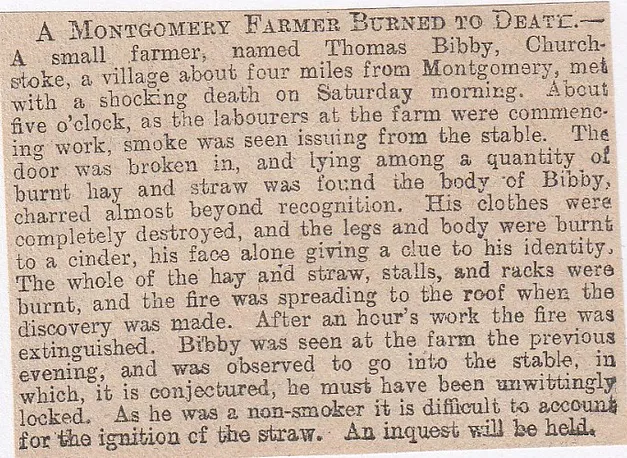
153/ Pumsaint, August 1876 (Victorian Killing Spree)
This is a Victorian equivalent of one of those American killing sprees that you see every now and again, in a shopping mall in Oklahoma for example. This one is the butler going around shooting those whom he thinks have done him wrong. The butler was named Tremble and his master was seventy-six-year-old Mr Johnes, a Carmarthen county court judge and he was first to be shot, then it was Mrs Cookman, Mr Johnes married daughter, then two dogs in the kennels and then onto the landlord of the “Dolaucothy Arms”, who fortunately was out at the time. Tremble went home and dropped a letter off for the vicar, saying how he wanted his estate handled, then threatening to shoot a couple of coppers who were trying to arrest him. Tremble held them off and went up to his room and there he sent a note to a vicar nearby asking if Mr Johnes was dead or not. He was still alive, only just, so they decided to tell him that he was dying and in a critical state, then there was the sound of a gunshot. The police burst in and found Tremble had shot himself in the chest and death came to him within half an hour. An act of heroism reported, later on, was when Mrs Cookman was about to be blown away by Tremble, the cook stood in front of her to protect her mistress, but he eventually shot Mrs Cookman and she too lay in a precarious condition.
The reason for this killing spree was that he had previously owned a pub in Cayo and wanted the “Dolaucothy Arms” which was owned by Mr Johnes, but was refused it. He handed his notice in about a month ago, as a result of the decision and saw it as a kick in the b***s for all the long service that he’d given him. Tremble left a widow and six children.
154/ Llanelli Fire, (Four Killed) March 1892
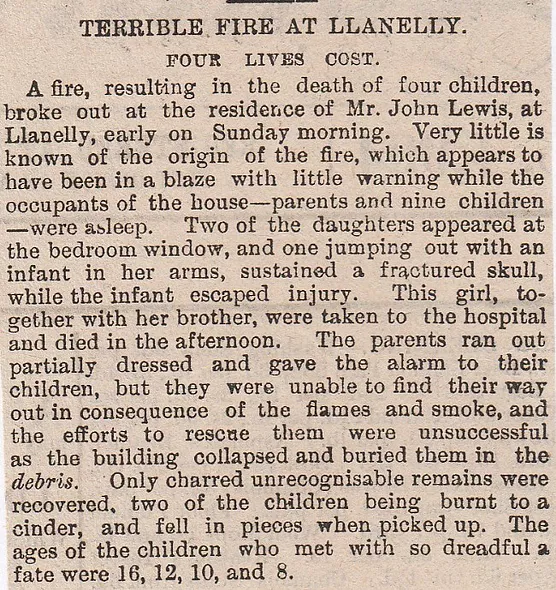
155/ Gresford Murder/Suicide, near Wrexham, May 1893
A groom by the name of Shellard turned up in Gresford after being in Liverpool for a while. When his mistress, Mrs Whittle, went up to bed he followed her. The other servant in the building, Prudence Taylor, heard a gun go off and found Shellard standing over the blood-soaked body of her mistress. He wafted the gun in her face and told her to go away, but while she was literally scared stiff and motionless, he chanted what was described as a prayer, then put the muzzle in his mouth and fired. She ran downstairs and later on she mustered up the courage to re-enter the room. In the room, to her amazement were the two corpses, both laid on the bed and the mistress had her throat slit. It is thought that he’d seen signs of life in his victim and did this to finish her off. This was premeditated by Shellard as a letter was found stating that he was going to kill Mrs Whittle, then himself. It turns out that she, Nellie Norris Whittle, was the wife of a Chorlton town councillor and she was sent there by her husband to stay away from Shellard, as her conduct was unbecoming. In modern-day terminology, they were shagging each other! She was twenty-eight and he was forty and had previously been her parent’s groom.
156/ Llanfallteg, (Three Killed on Railway) August 27th, 1885
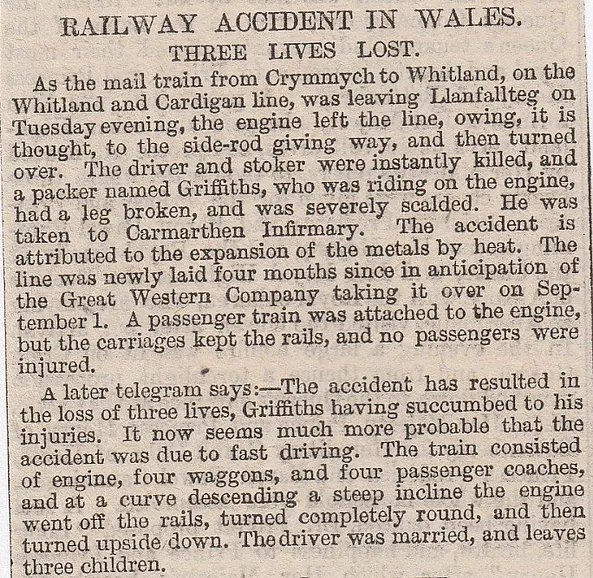
157/ Llanfallteg (Fatal Railway Accident) September 1st, 1885
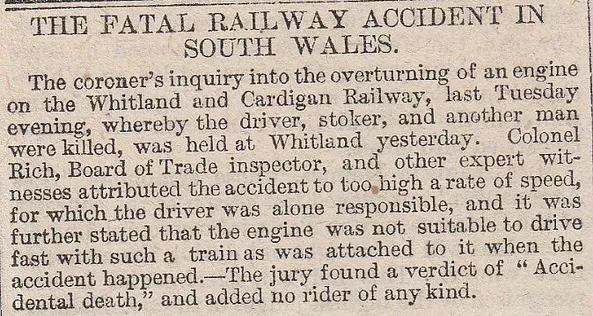
158/ Beaufort (Monmouth) (Weird Suicide!) April 1858
I don’t think Wales will ever have a stranger suicide than this for another 150 years or so. George Screech, in his late forties and from Somerset, had gone to Wales to get a job in the mines. He was lodging at a relatives house, Richard Greenland, who also worked in the mines. Screech had mentioned to Mr and Mrs Greenland that he would rather be dead than work in the mines but they just passed it off as idle chatter. Mr Greenland kept a couple of casks of explosive powder in his house for work purposes, but it seemed that Screech thought it too much of a temptation. While Mrs Greenland was out of the house he got a hot coal from the fireplace and put it next to the fuse and sure enough, the place exploded. Screech died several hours later of his injuries and told medics that the Devil had tempted him. The Greenland’s little baby survived the explosion. Screech was buried at night with no funeral rites on unconsecrated ground, as was the norm for suicides.
159/ St Brides Bay/Stack Rock (Pembrokeshire) March 1899
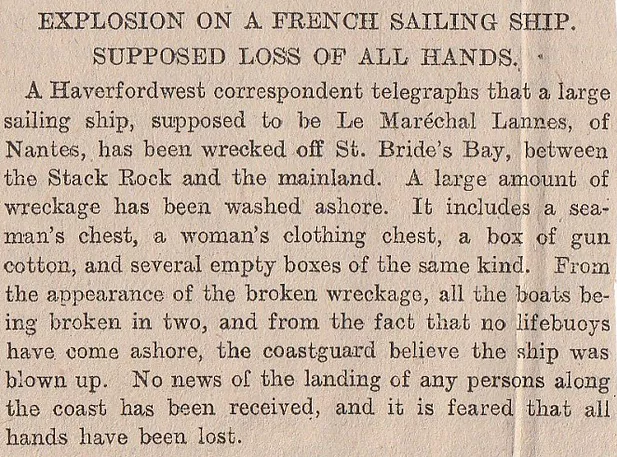
160/ Llansawel Suicide, December 1862 (It is still there!)
Llansawel was abuzz with the rumour that Thomas Thomas aged forty-four, a watchmaker, had killed himself by hanging himself in a stable that is next to the Angel Inn. The landlord of the Angel Inn said at the inquest that Thomas had been round and had a pint and a natter, then left him in the kitchen. He never saw him again until he went into the stables at 6-30 p.m., when he spotted a hat, then looked around to see if anyone was in there and found him hanging from a cord which was fastened to the manger, then thrown over a beam and then around his neck. He had been dead for several hours and had recently been very despondent in his mood. He seemed to deteriorate more each day.
161/ Aberystwyth College Deaths, July 1885
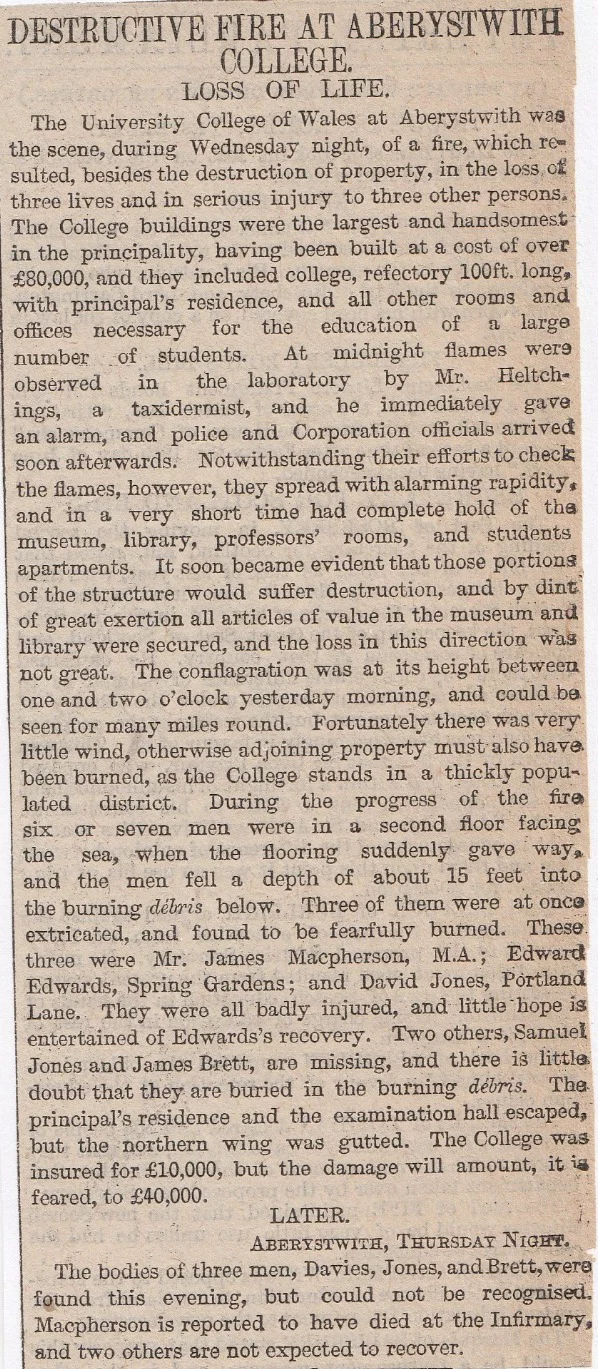
162/ Port Dinorwic, (Suicide Leaves Sad Letter) January 1917
A sad story of a 45-year-old lady who thinks herself a failure, then kills herself, with all explained in a suicide note she leaves behind.
Miss Annie Williams, a school teacher from Holyhead on Anglesey, was found decapitated next to the railway tracks at Port Dinorwic. She was staying at relatives in the area and had been under the care of her doctor, Lloyd Roberts for about five years, for nervous depression. The postmaster said he saw her come in at 6-10, then she took fifteen minutes to write this telegram- “Met a friend; shall not return tonight”. The man who found the body at nine p.m. saw a hat next to the rails and then saw the headless body of Miss Williams and went to fetch the police. The letter was addressed to her aunt and uncle (Evan Thomas, Menai Bridge) It read:
“My Dear Uncle and Aunt- By the time you read this letter, I shall have gone beyond recall. To ask forgiveness would be a farce. But since I realised some weeks ago there is no cure for my nerves, and that I would never be capable of good work, physical and mental. I have been very miserable. It has been my lifelong ambition to get good results in school, and for that reason, I have tried everywhere to get on well. But all my efforts have been failures and the knowledge of that has come as a shock that everything since then has gone wrong-or, at any rate, I have gone wrong with everything, and have lost my prestige in and out of school. Such being the case, it is out of the question for me to go back, and besides, I have worried so much about it, that I don’t think I could do anything there. You will find a few remarks about my affairs on a separate sheet. I have nothing to worry me except that I am a neurotic, and never can be anything else. I know what the strain of mental work has been in the past, and I never wish to go through it again. I also know how incapable I am of hard physical work, having tried it, and there is no room in the world for those who can’t work in the future, when times will be so hard. Before closing, I should like to express my thanks to those who have tried to help with their advice, which, owing to my delusions, I was unable to use at the time. I include in them the doctor (Lloyd Roberts) who did his best for me; also yourselves, whose tenderness at all times has been very great, and I know you will do your best again for my dear mother. I am afraid that mother and W.will be heartbroken, and it is a cruel fate that necessitates a daughter doing such a deed. I am doomed to it, wherever I shall be. With apologies from your dear niece- Annie”
Also on the body was a plain envelope with these words written on it -“Enclosed is what I had in my purse. Please don’t judge me hard. I really have had some hard times to get right. It is terrible fighting so hard.” (Poor lass- is she buried locally?)
163/ Bettws-y-Coed Tragedy, June 1891
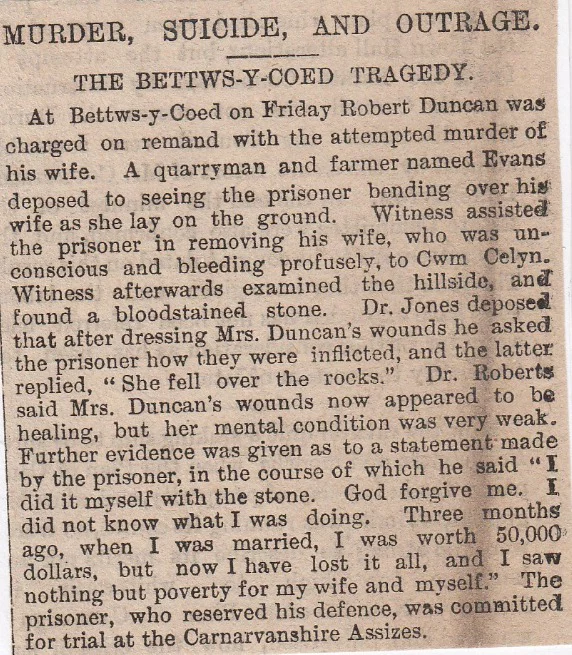
164/ Westminster Hotel Suicide, Rhyl, September 1892
The Westminster Hotel is still there in Rhyl on East Parade and was the scene of a juicy tale in 1892. The Reverend Joseph Weedom of Morton Vicarage in Bingley committed suicide by shooting himself in the head whilst at the Westminster Hotel in Rhyl.
A couple of weeks previously the Reverend and a young lady booked into the hotel as “Rev.Mr and Mrs Weedom” and they enjoyed the time in the Welsh seaside town enjoying each other’s company, but when it was time to check out of the hotel the Reverend didn’t have the £18 needed to settle up. He was told to wait for the proprietor and he went into a waiting room. That was when the young woman rushed through saying that her husband had cut his throat. Two things were wrong in her statement, the first was he had shot himself, the second was that she wasn’t Mrs Weedom. It turned out that she was Beatrice Broadbent the twenty-six-year-old cook of Reverend Weedom. While she had been working at the vicarage, the two had become very close and he had even told her that he would divorce his wife and marry her. The Reverend was off on holiday and told Miss Broadbent to meet him at the train station in Leeds, so they could have a “dirty fortnight” together. While in Rhyl the Reverend got a message from his mother in Chester, telling him to come and see her. He did and came clean about the cook and his wife. The mother told Weedom that wife already knew all about them both and was going to divorce her husband on the grounds of infidelity. He came back to Rhyl depressed and went out and got drunk one night. Then when they were about to check out, he never had any money at all, plus no wife now and everything was crumbling around him. He took out his revolver, while Miss Broadbent waited for him in room No 42, and blew his brains out.
165/ Graig Pit Explosion, near Aberdare, February 1892
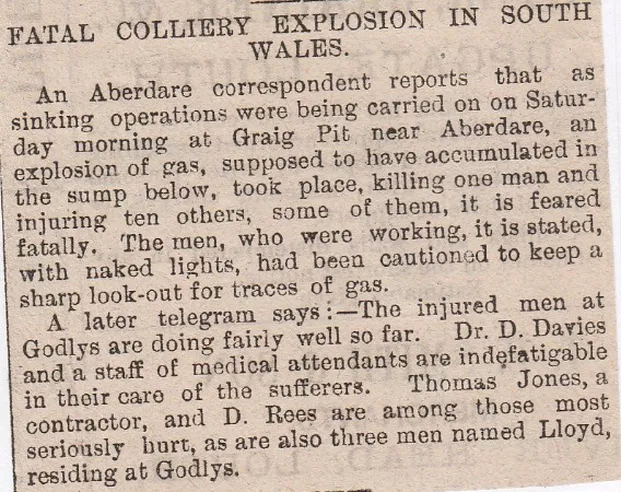
166/ Chepstow Shooting, September 1870.
On Tuesday evening an accident occurred at a shooting party. Charles Jones, a keeper to Mr Kerr, of Itton Court, Chepstow, was shot by a gentleman named Richards. As Captain Cowburn and his friend Mr Richards, with other gentlemen, were sitting down to luncheon, one of the party cried out, “There is a rabbit running”. On jumping up to fire the gun went off, and the charge lodged in the keeper’s leg. He died of his injuries yesterday morning.
167/ Aberdovey Drowning, July 1870.
The Pall Mall Gazette reports a distressing accident from Aberdovey, a well-known watering place on the west coast of Wales. A party of five young ladies were bathing, and two of them-Miss Lavelle and Miss Ellen Edwards- who remained in the water some time after the others came out, got out of their depth. Loud cries for assistance were raised, and a police constable who was on the beach plunged into the sea and succeeded in rescuing Miss Edwards. The other young lady was drowned.
168/Llansamlet Colliery Explosion, July 1870
